#and thus... the Soul arc ends... ))
Explore tagged Tumblr posts
Text
more yandere octotrio!
Dedicated to @mr-trick <3 ty for your support
"Your grades have been slipping."
When you had been called into Azul's office, you certainly weren't expecting him to scold you like a parent. To add insult to, well, insult, Jade and Floyd were there, too, and the latter couldn't stop themselves from snickering.
"I wasn't aware that was any of your business." You shot back. You didn't bother asking how he knew–you'd had twin eels trailing you since Azul's overblot. It was rare for you to go anywhere these days without the sight of one looming at you from this distance. If their heights didn't make them obvious enough, there was the eyes. Though you had a feeling stealth wasn't the goal.
You'd be right. The tweels found it very important that you knew they were close by. Azul may have preferred for them to be stealthier, but they enjoyed your reactions too much. Plus, their presence kept others away. It's probably why Azul let them continue.
But back to the scene at hand.
Azul's response comes naturally, almost too naturally–as if he was prepared for that response. "Of course it is. The success of Night Raven students has always been my business–"
The look you hit him with was enough to stop him in his tracks.
He chuckled, adjusting his tie and his approach. "Of course, business has changed in recent times. In the past the goal was to attract as many poor unfortunate souls as I could, offering contracts with the goal to better myself, and not them. But now I've mended my ways and made a switch, so to speak. Now I wish to truly help and better those I come into contact with, starting with those I already feel close or indebted to. And what better first than the one who helped me see the light in the first place."
He waited for your response, but you offered none. Not unless you included your suspicion.
"Look, business has been rough lately since the incident, and helping you seems like the best way to restore people's faith in me."
"And thus the truth comes out."
You were so proud of yourself for sussing him out. What you didn't know is that that wasn't the truth–like at all. He didn't give a fuck what the other students thought of him, especially since he was still getting business regardless. This was about you and spending time with you, the strange, magicless student that had caught his attention like a worm on a hook. Buy to you, that would be even harder to believe than an act of true goodwill.
But that didn't matter anyway, because he had you. You agreed to help him out of the goodness of your heart–taking the opportunity to mock him. It was difficult for Azul to keep the smirk from his face as you fell into his hand. He could tell the twins felt the same way. Even if he couldn't see then standing behind him, he could still tell when Jade's gloved hand went to cover his smile, and when Floyd's slight sway stilled just enough to zero in on you.
With that, a deal had been made: you let Azul help you out of the "goodness of his heart," and you spread the word of Azul's redemption arc.
As soon as you're gone, Azul lets an easy smirk spill onto his face like oil in water.
"We got 'em boys."
What would follow is a series of study sessions, every night, either with Floyd, Jade, or Azul himself. Study session with Floyd rarely involve studying. Sometimes you would start with studying, but he’d always end up getting bored at some point, and then declare you two would be doing something else. Other times, you wouldn’t even get a chance to study, as he’d already be dragging you off somewhere before you can even set your stuff down. Floyd, being Floyd, ‘something else’ could include anything depending on his mood. Some examples of activities you’ve done during study sessions with Floyd: karaoke, ping pong, pottery, a treasure hunt all over the school for something Floyd lost a while ago and had suddenly remembered at that moment (it was in his pocket), ballroom dance classes, shopping, video games, baking. You don’t even bring any study materials with you at this point.
Jade and Azul are more what you’d expect from tutors.
Jade’s method of tutoring is hands off. He mostly just has you do your homework while he sits across from you, working on his own stuff. And if you don’t have homework or finish before study time is up, he’ll give you readings and practice assignments to do. He encourages you to ask him questions whenever you have them, but for the most part, you two are silent. What you don’t realize is that he actually spends most of the time just staring at you. Studying you.
Azul is more hands on. Like with Jade, youre expected to either work on a class assignment, or one of Azul’s specially crafted study guides. Unlike Jade, who always sits across from you, Azul sits—or, more often, stands—next to you. Instead of just silently watching you work, Azul works you through each problem. He’ll often end up hovering next to you, sometimes taking your writing hand in his to guide you through whatever problem you’re working on. He also offers coffee/tea/snack breaks, where you two can just talk, not just about schoolwork, but anything else.
You’re spending every night with one of them. You often get back to Ramshackle late (especially if it was a session with Floyd). You don’t see Horns as much, if at all. Study sessions with your freshman friends become almost nonexistent. Even Grim is starting to see less and less of you everyday.
Who you end up spending the most time with is, of course, the Octotrio. Not just for nightly study sessions anymore. Floyd will approach you outside of tutoring for fun activities. Jade often offers you treats for doing so well, including trips to Sam’s and lunch at Mostró Lounge—all on him, of course. And Azul often pops in to check in on you—to make sure you’re holding up your side of the deal. And, even if you don’t realize it, there’s always at least one of them waiting to walk you to class.
It’s no secret that Azul basically always has business on the brain. And this? This was his strategic move to monopolize you, and he got you hook, line, and sinker.
#yandere#yandere rambles#yandere twst#yandere twisted wonderland#twisted wonderland#twst#yandere octotrio x reader#yandere octotrio#octavinelle#yandere octavinelle#octotrio#yandere azul ashengrotto#yandere jade leech#yandere floyd leech#yandere x reader#yandere oneshot
593 notes
·
View notes
Text
JASON TODD VS. DABI: WHY NOT ME?
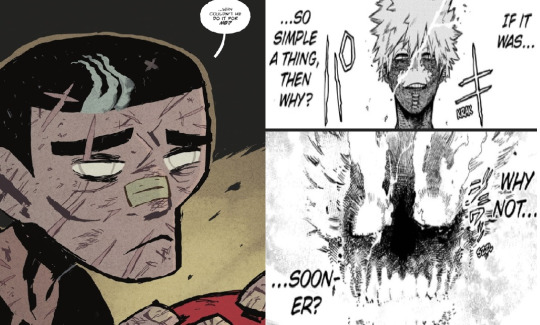
"You haven't been here long but you've seen him, right? The batman. The batman. He lives in darkness, to find the helpless and bring them into the light. So I have to wonder...why couldn't he do it for me?" The Boy Wonder: Issue #2
This is the story of the boy who didn't get saved. The story of a boy who really ought to have been saved. Of course, every victim deserves to be saved, but this boy was the son of a superhero. Can a hero who saves everyone, but fails to save his own son really be called a hero? As for the son, how does it feel to watch his father save complete strangers but let him fall to the wayside?
Jason Todd and Dabi are two characters with similar backstories and motives (so similar it's possible Dabi is outright based on Jason Todd) which are worthy of comparison. These are two tragic arcs which explore the conflict between a hero's responsibility to act as a father, and their responsibility to save people. As I said they are tragic because in both cases the hero fails, as a father, and a hero. However, I'm comparing the two because Jason Todd's story is a well written tragedy, and Toya's story is not.
If you were to write a story of my life, it would surely be a tragedy.
Aristotle's Poetics is the first attempt to define what Tragedy is, not as a story where sad things happen but a specific story structure. He outlines not only what makes tragedy, tragedy, but also what makes a good tragedy.
The Plot, then, is the first principle, and, as it were, the soul of a tragedy: Character holds the second place. A similar fact is seen in painting. The most beautiful colours, laid on confusedly, will not give as much pleasure as the chalk outline of a portrait. Thus Tragedy is the imitation of an action, and of the agents mainly with a view to the action.
I use this quote because the painting metaphor is a great way of explaining what I'm getting at, you can have a painting with the most wonderful colors, you can have a story with really good ideas like the Todoroki family plotline but if you don't use those colors correctly all you're going to end up with is a bad painting.
In poetics Aristotle clearly defines a tight well-structured plot as the first priority for effective tragedy, character as second.
Again, a beautiful object, whether it be a living organism or any whole composed of parts, must not only have an orderly arrangement of parts, but must also be of a certain magnitude; for beauty depends on magnitude and order. Hence a very small animal organism cannot be beautiful; for the view of it is confused, the object being seen in an almost imperceptible moment of time. Nor, again, can one of vast size be beautiful; for as the eye cannot take it all in at once, the unity and sense of the whole is lost for the spectator; as for instance if there were one a thousand miles long
To make sure you understand, it's vital in tragedy for all the pieces to fit together. Tragedy is a specific story format. Good tragedy uses the parts of a story well, but bad tragedy is sloppy and poorly put together. In tragedy, the whole has to be greater than the sum of its parts. The Todoroki Family are all good characters out of context, but the story could have enhanced their characters but detracted from them due to how poorly it is told. The fact that a lot of MHA fans are in love with the Todoroki family out of the context of the story, but also have constant complaints for how Horikoshi handles their plotlines is, in my opinion, very telling.
What Aristotle goes on to posit is the best tragedies do not come about by accident, but rather by the direct actions of the characters.
But again, Tragedy is an imitation not only of a complete action, but of events inspiring fear or pity. Such an effect is best produced when the events come on us by surprise; and the effect is heightened when, at the same time, they follow as cause and effect. The tragic wonder will thee be greater than if they happened of themselves or by accident; for even coincidences are most striking when they have an air of design.
Therefore Tragedies require consequentialism, like Newton's Third Law, every action will have an equal and opposite reaction. To simplify a good tragedy arises from the consequences of the character's actions (or inaction). The most basic form is that the hero of the story will have a tragic flaw that they fail to improve upon in time and then leads to their destruction. In essence, tragedy is where the hero fails. Not only does the hero fail, but the hero loses, and that irreversible loss is what defines tragedy. Medea slays her own children, Oedipus rips his own eyes off and deserts his kingdom, Creon Antigone is buried alive and Creon's son, her fiancee, commits suicide.
These events share two things in common, they are irreversible (hence why they feel like good endings), and two they evoke catharsis. Aristotle defines the goal of tragedy to evoke terror and pity. We feel alongside these heroes, Medea was abandoned by the husband Jason who she left her home and slaughtered her own brother for, Oedipus did all of his crimes unwittingly and is a victim of fate, Antigone was doing the right thing by burying her brother so his soul could pass on to the afterlife.
There's all different sorts of tragedies, Hamliet explores more here. I'd say UTRH and Hellish Todoroki Family are tragedies centered around grief.
Tragedy works on extreme emotions, and extreme hard-hitting consequences to the hero's failures. The worst thing a tragedy can be is boring.
The Tragic Hero
Now that I'm done lecturing you let's actually talk about both My Hero Academia and Batman like I promised. Both of these stories don't actually feature the central victim as their protagonist, and that is a feature not a flaw.
Rather, the story we are being told is that of a tragic hero, failing to save a tragic victim because of their own personal flaws.
These flaws are called (hamartia) or "error in judgement". A hero, being called a hero of a story is often unaware of his flaws which is central to what makes them unable to fix those flaws in time. That flaw can later lead to a moral failing, such as Othello's jealousy, initially jealousy is an understandable emotion, but then it leads to him trusting Iago over his own wife and killing his wife in a rage.
Most importantly, the hero’s suffering and its far-reaching reverberations are far out of proportion to his flaw.
Let's begin with talking of the heroes and their flaws, Batman and Endeavor. My main reason for comparing these two is in these specific stories they have the same flaw, inability to move past their personal guilt towards their son, and the same conflict the duty of a father versus the duty of a hero.
However, Batman functions as a tragic hero, and Enji does not. The summary of their conflict is right here in these two panels.
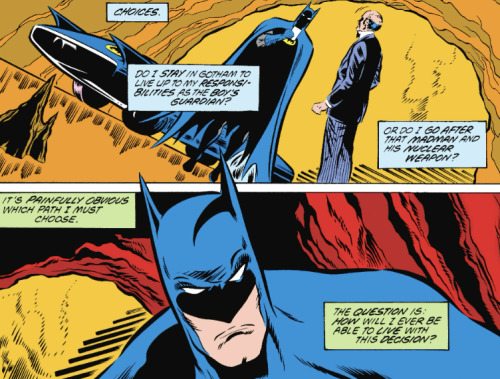
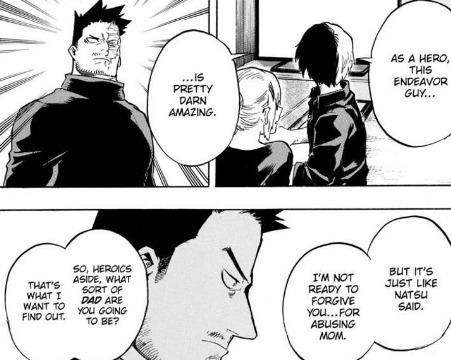
A parent is required to place their children above everything else, because they are the ones responsible for bringing that child into the world. Bruce Wayne made the decision to adopt Jason. Enji made the decision to have children, however with Enji you have the added insidious motivation of he only wanted to make designer babies and just didn't care for the ones who didn't turn out right.
Bruce attempts to do both, to act as a father for Jason and also a crime fighter as batman but he can't do both. This comes to a head in Death of the Family when Jason is having serious trouble because of his lack of a strong parental figure, and Bruce knowing that Jason is in trouble chooses still to go off and fight crime instead of staying with him. The choice to place crimefighting over the child they chose to take responsibility for has the unintended consequence of getting that child killed.
Whereas Enji makes the same choice over and over again, ignoring Toya's clear troubles at the fact his father no longer spends time with him and choosing to run away to the world of heroes because he doesn't want to face the fact that his actions are severely hurting his son. Bruce's motivations are more sympathetic admittedly he wasn't actively practicing eugenics, but the choice is the same and the consequences are the same.
Both Bruce and Enji are forced to bear witness to the deaths of their children when they are not there, specifically because they made a choice to be a hero instead of staying by their child's side. A situation directly caused by their choice to be a hero over a father, and a situation that would have been avoided if they had stayed with their child in their time of need. Jason runs off when Batman tells him to stay and gets kidnapped by the Joker, if Enji had been on Sekoto peak that day Toya would never have accidentally lost control of his fire.
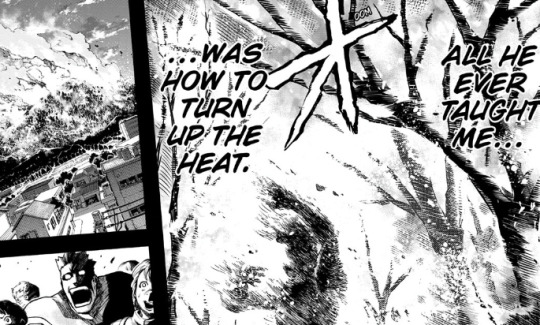
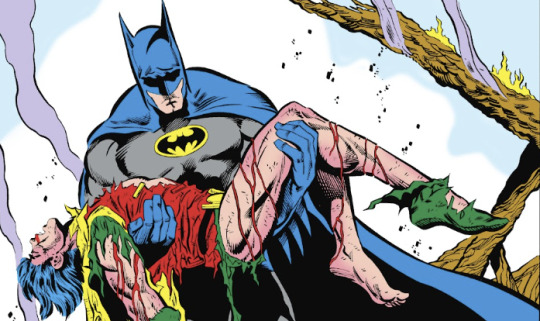
This is just the backstory however, the main event that kickstart this plot is the unexpected return from the dead of both Jason and Dabi. Each story follows the same plot beats. A new villain appears to challenge Endeavor / Batman. The villain reveals themselves as their dead son. Both Endeavor / Batman are given a chance to try reaching out to their sons, but they choose not to.
Then even though they are given a second chance with a miracle of a dead son coming back to them, they choose the exact same thing they chose before, being a hero and because of that the tragedy repeats itself. For both of them they are unable to save their son again, and the son goes through a second death. History repeats itself, the lesson isn't learned.
Their fatal flaw is their guilt. This is a story about grief and mourning after all, a son who is died, buried, but never grieved properly, never mourned, an open wound on the father suddenly coming back. The inability of each to process their grief blinds them from seeing the fact the son has come back, and they have a second chance.
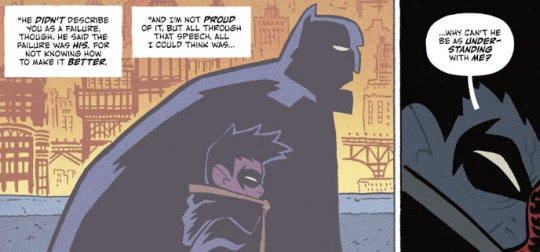
Toya has internalized he is a failure, because Enji literally called him that. Jason believes that Batman thinks he is a failure. In both cases the father is the one who failed, Bruce at least acknowledges this but cannot communicate it in any way shape or form.
This guilt and responsibility both Enji and Bruce feel causes them to self-sabotage. They no longer have the confidence they are in the right (they no longer feel like heroes because they have failed to be heroes to their own son).
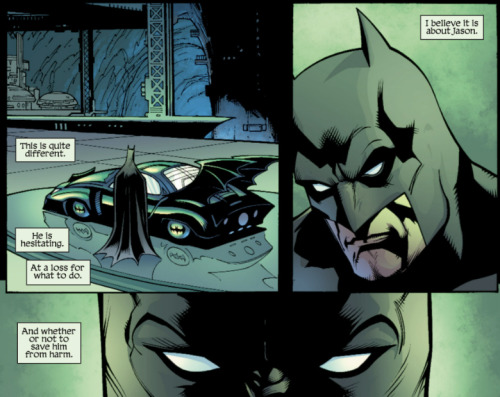
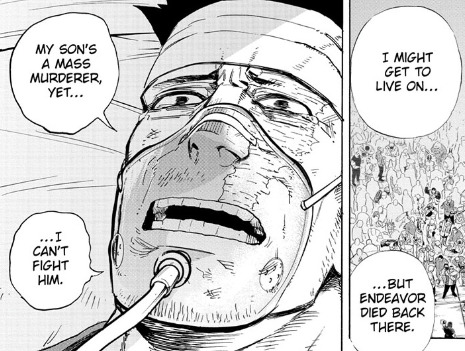
You can also add the layer of complication that since both men chose to be heroes in the past, they do not know how to handle the situation as a father now that they're being challenged to step up as one. Unfortunately, they are not the fathers that stepped up.
The reason their grief becomes a flaw is because they put their grief over their victims. . Each man is aware too much of their own failure, and while they should feel guilty they make the classic mistake of placing their own guilt over the feelings of the victim. The guilt they feel for causing the death and the genuine grief of losing a son is given priority over Jason and Dabi who you know... actually died.
An overwhelming grief and guilt is understandable because grief is a messy and human emotion, losing a child is an unimaginable tragedy that should never be inflicted on anyone.
Yet at the same time both Dabi and Jason are grieving to. This paradox that Batman only thinks of his own grief at losing a son and never stops to think about how Jason must feel leads to one of the best lines in Under the Red Hood.
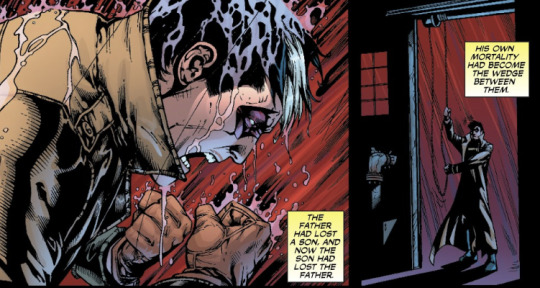
"The father had lost a son, and now the son had lost a father."
Batman's guilt is so strong over being the cause of Jason's suffering, that the suffering of the victim himself is ignored. To be fair to My Hero Academia, the Todorokis say a similar line to Enji.
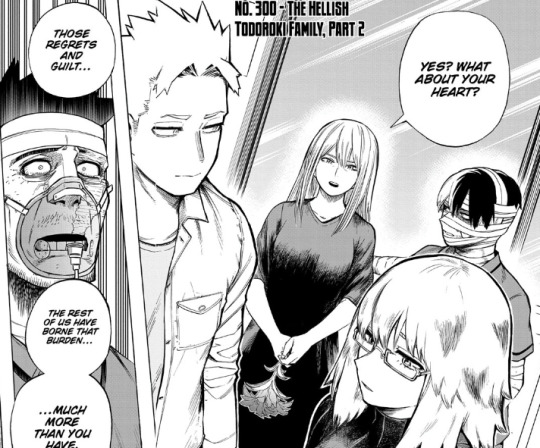
However, this is where I begin to get into the difference between ideas and execution. Tragedies are stories of actions and logical consequences, every action has an equal and opposite reaction in Under the Red Hood. Batman is punished for the choices he makes, the choices he doesn't make, and the choices he fails to make in time.
The Todoroki plotline features almost none of its character making any choices of substance, and because of that the plotline says the right things over and over again, but it all comes off as tell don't show.
I'm going to quote @codenamesazanka's post right here a couple of times because they describe the complete failure of the Todoroki plotline to show us a reason why we should be feeling things for the characters artfully.
We've heard Enji say this before - I'm sorry, I intend to atone. It's indeed the right thing to say, it's exactly what he should be saying and acting. Natsuo is declaring no contact - That's fine, I'm sorry, I accept this as part of my atonement and will continue. Touya calls him a coward - That's fine, I'm sorry, I accept this as part of my atonement and will continue. The public hates him - That's fine, I'm sorry, I accept this as part of my atonement and will continue. But you can only hear this so many times before you want to snap and beat the character, the story, the writing over the head with Enji's wheelchair. Why is that? He's behaving exactly as he should, and yet...
The reason why it fails to evoke strong feelings is because of what we'd called "narrative dissonance." The actions of Bruce and Enji are the same, they both neglect to do anything, make any real attempts to reach out to their victims because they're paralyzed by guilt.
However, we are told that they have entirely different arcs. Bruce's arc is a tragic fall. He's failing as a hero. While we are being told that Enji is experiencing an arc of atonement. Enji is supposed to be improving himself, and Bruce is supposed to be experiencing negative character development but they both do the exact same thing in story. Bruce neglects Jason, we are told by the story, by the characters in the story that Bruce is failing Jason. Enji does nothing in time to actually atone for Toya or try to help him, yet, we are told again, and again, and again, and again, and again, and again that Enji is atoning with nothing substantive to show us this is the case.
To show what I meant instead of telling this scene is in chapter 252.
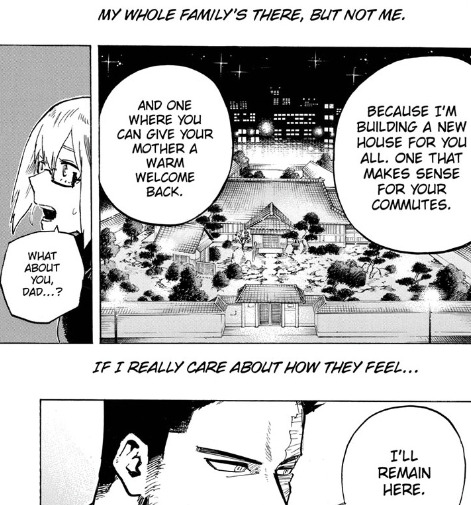
This scene is the ending point in chapter in chapter #426.
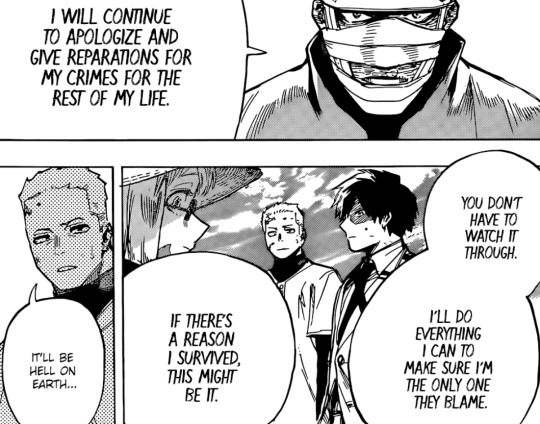
It's just him repeating the exact same sentiment and yet in a more than 150+ chapter gap, Enji never made any action to show he was now placing his family first. Enji didn't say anything to Dabi when he revealed himself as Toya. Enji didn't look for Toya in the months before the final war arc. Enji literally appeared on live TV in a broadcast that Toya was watching and said the very selfish "Watch Me" atone for the crime of creating Toya instead of literally talking about Toya or too Toya. Well, that would have rocked the boat too much... THAT IS LITERALLY THE POINT. Enji had to somehow break from tradition or make some significant sacrifice onscreen to his social standing to show that he's willing to put his family first. Enji decides to go along with Hawks decision to not face Toya head on, making the decision to be the hero for the final time which directly causes Toya to get up after Shoto brings him down non-lethally and make one last attempt to suicide bomb for his father's inaction.
Bruce does nothing for a long time in Under the Red Hood. He ignores his initial instinct that Jason came back and instead makes a long investigation on whether or not someone can come back from the dead in order to distract himself. When Jason takes the mask off, Batman already knew but was pretending otherwise because he didn't want to face the reality.
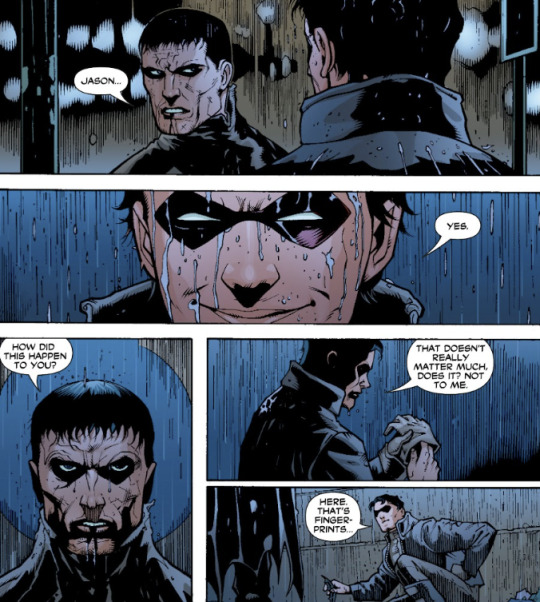
Even when Jason takes his mask off, Bruce still takes on the "I need to investigate this" angle even though Jason calls him out that deep down he already knows it's the truth. This of course foreshadows Bruce's underlying flaw, he doesn't want to face Jason head on because he feels too much grief about what happened to Jason and his guilt is more important than Jason's own grief. Just as the father has lost the son, the son has lost the father.
What follows is several chapters of Batman fighting crime as usual and making no attempts to directly search for Jason. They cross paths a few times but when they do Bruce doesn't follow. In fact, Bruce only shows up when Jason sends Bruce a sample of the joker's hair and Bruce knows that the Joker has kidnapped him out of Arkham. Bruce almost lets Jason get killed by Black Mask because he doesn't know whether to stop Jason or save him yet again, and then they have their final showdown where Jason has kidnapped the joker to demand Bruce kill him, and Bruce finally attempts to talk him down.
Out of context it sounds like I'm describing the same plotline, to the point where if you haven't read either, it looks like I'm complaining baselessly. Why is one hero doing nothing until it's too late good, and the other bad? The difference is of course context, or rather framing. Bruce's actions are called out by the people around him (Dick, Jason, Alfred) as him handling the situation wrong. Whereas both Enji's internal monologue and other characters say that he is doing his best to atone for his actions and deserves a chance, but the events we are shown in story are the exact opposite.
Here's another example to SHOW my point. Here's Dabi with my special, hardcover edition of under the Red Hood.
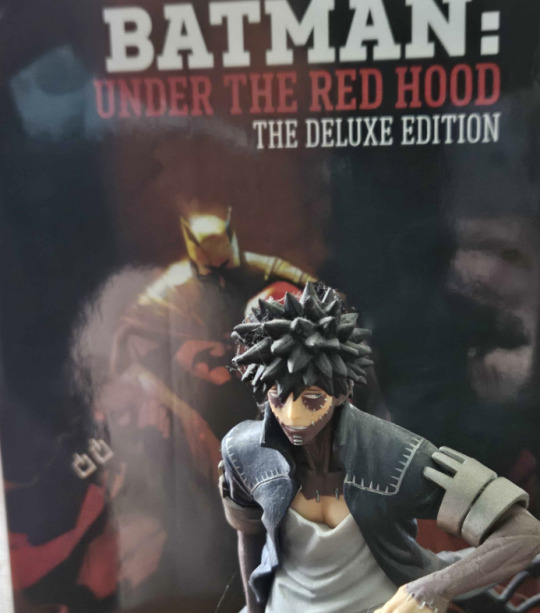
I reread the entirety of the fourteen chapter plotline and the majority of internal narrations come from characters outside of Bruce observing his behavior and commenting on how differently he's acting. Jason's backstory for instance is told by Alfred, not Bruce. Dick Grayson the first Robin comments on Batman's odd behavior. The rest are the third person narrator. Bruce has four instances of internal monologues spanning a few pages each in a 378 page story. (Alfred has the most internal monologues and he's presented as a more trustworthy unbiased narrator than Bruce, to get us to question Bruce's actions).
"Information travels on many routes, sometimes it comes predictably like the tides. You just need to know where to stand and meet it. Other times it's elusive and you have to root through the garbage to find it. In the last few years I've come to rely on Barbara Gordon, Oracle, we all did. Utilizing every form of surveillance equipment she has been the eyes and ear [...] but those days are over. I can't rely on anyone anymore. [...] and tonight it's also about the company I keep. It's different with him [night wing] out here. I think about when he was younger, when I was younger, it was different, simpler and I miss it. I miss those days, for that it's hard to be around him.
This first internal monologue is a case of unreliable narrator, because as soon as finishing it Dick Grayson / Nightwing shows up, offers Batman his help and while Bruce at first refuses it the two of them are forced to work together to fight Amazo. What does this show us? Bruce is not alone, but Bruce actively acts like he's alone ignoring the feelings of the other people around him. It exhibits a flaw of Bruce and the bad headspace he is in mentally (if I remember correctly Stephanie Brown recently died in the comics while this storyline was being published. It establishes Bruce's improper coping mechanism with grief, and how he is going about it the incorrect way.
Bruce says I work alone, and then Bruce says it's easier working with Dick, I miss it, but I can't go back to those days. It's bruce's contradictory thinking patterns in the same chapter that stop him. it's bruce's fault he cannot connect to Dick, and he is actively mourning the past because his relationship with Dick has changed.
Now the final part of the monologue in that chapter.
He's quick. Not just fast, agile. He's not thinking about his next move, he's just making it. He's been trained well. And there's something about him. Something familiar. There was something interesting about before he cut the line, before it had been taught. That had to have been practiced. Either that or just plain dumb luck. No it's not luck.
This is the first hint that Bruce already suspects it's Jason from early on but is in denial about it. This unreliable narrator trope also gives an agency to Bruce's decision, he is actively choosing to ignore the possibility that it's Jason because it doesn't want it to be.
Whereas, a lot of Endeavor's plot takes away any agency from him. For example, he doesn't even know that Dabi is Toya, because if he had the sneaking suspicion and ignored it like Batman did that might have made him look bad. We can't have the main character in a tragedy looking bad now can we?
The second monologue is more denial.
That device is from Kord industries. I should know. Ordered it special from them. How can he have it? No more dead ends. No more questions. No more guessing. Tonight I find out what is passing for the truth.
Reading between the lines this is outright confirmation Batman already knows.
The third is a brief reflection in his feelings for Jason.
The armor has to be light enough to fit but strong enough to protect. But sometimes a great many times, it's not strong enough. It wans't strong enough for Barbara who has to fight from her chair. It wasn't strong enough for Stephanie, other dear soldier enough dear grave. And it wasn't enough for Jason. Willful Jason. Who ignored the danger. Who spat at risk. Who was never frightened enough. I've always wondered... always... was he scared at the end? Was he praying I'd come save him? And in those last moments when he knew that I wouldn't. Did he hate me for it?
This monologue directly shows without stating it outright, Bruce is prioritizing his feelings of grief and failure mixing them in with his genuine grief over the loss of a son. it's selfish of him, but grief is a selfish emotion.
Here's the thing Bruce is allowed to be selfish and to not have the correct reaction to his grief, because the whole story is centered on Bruce being unable to get his shit together in time, and this picture into his emotions is an explanation as to why. Bruce is afraid of being hated by Jason. Jason of course has every right to hate him for failing as a father, but still I think not wanting to be hated to a person you loved so much and feel genuinely sorry over what you let happen to them is an understandable reaction.
Meanwhile we have Enji saying repeatedly all the right things in his monologue, the selfless, I don't need to be forgiven, it's okay if they hate me, I just need to atone but he never actually does anything. There's no explanation for why he isn't doing anything either, so that narrative dissonance. We're shown why Bruce doesn't act in time, he's internally a mess to be frank. We are not shown why Enji doesn't act in time because his internal monologue tells us again and again he's committed to atoning and he understands what the right thing to do is.
As Codenamesanzanka says:
Enji is still saying all the right things, but the story isn't giving him the opportunity to actually do the right things. To have his new actions matter. I have no doubt about his sincerity in his mantra, but without the 'show', it's hollow. Similarly, "Let's talk" is actually kinda bullshit too, because it's so vague. This is less about Enji, and more about the writing, how it set up this scene. "Let's talk" or "I want to talk" or any of that variation is repeated 6 times, without anything more or specific added.
There's an excess of repetition of Enji saying he wants to atone, he's ready to atone, without any of that materializing in the story.
As @class1akids says in this reaction post:
It also feels also super-hollow to say he's sheltering the family from the fallout, after they've just talked about how Fuyumi lost her job (and got a new one through the connections she herself built). How is he going to do that?
The fourth because I don't want to write it down, it's just Batman monologueing on how his partnership with Jason is still good and explaining the technical details of his fight with count Vertigo. It's in chapter 10 if you must look it up.
So four monologues total. Two monologues establish indirectly that Batman knows that Red Hood is Jason and doesn't want to face him. The third monologue establishes why he doesn't want to face him, he's afraid of being hated. The monologue is in line with Bruce's actions in the story, Bruce investigates several ways of reviving from the dead instead of looking for Jason.
The character's reactions around Bruce are also talking about how he's not acting like himself. Especially Alfred's who speaks of Bruce's indecision, on whether to put a stop to or save Jason.
"It is curious. He is lost in thought. It is not like him to spend vast stretches of time immobile, where his mind is gripped in the solitary process of deduction. This is quite different. He is hesitating. At a loss for what to do. I believe it is about Jason. And whether or not to stop him or save him."
This is illustrated in two scenes later where Jason spends a long time simply watching when Jason is fighting enemies, first in a fight against Captain Nazi, and second Black Mask. Jason even gives a direct callout of that behavior.
Jason: What the hell took you so long? Couldn't decide if you wanted to let me live. Batman: Shut up and fight.
Observed by Alfred Bruce is completely stalling and can't choose, observed by Jason Bruce can't decide whether to let Jason live or not. Bruce hesitates twice. We know why. We see it in action. It's called out as flawed behavior.
Now let's cover all the tell that don't show that is Endeavor's many monologues.
Pro Hero Arc:
I have to safeguard the future for them. That's the job for whoever's on top. What about the lives I cut short? Just demanding forgiveness isn't enough, it's too late for that. At this point I need to atone there's no other route.
Hellish Todoroki Family 1:
I'm trying to make ammends going forward. It might be too late. but I fall asleep every night thinking about it. Lately it's been the same dream. The wife and the kids looking happy at the dinner table. But I'm never there with them. It might be too late but I fall asleep every night thinking about what I can do for my family. I wish you could be here too, Toya. It's always the same dream. My whole family's there but not me. If I really care how they feel [I'll remain here].
I'm not going to read 200 chapters so I'm just going to ballpark it based on memory. Here we go.
Dabi's Dance:
My eldest, Toya didn't harbor frost within him. He didn't have a way to overcome the inescapable downside of overheating but I nevertheless sought to raise the boy as a hero. [...] Because Toya had more potential than me I placed my ambitions on his shoulders. I thought it could be you. You could have been the one to reach my eternal goal. My frustration... My envy... The ugliness in my heart... you could have been the one to smash it all to dust.
Plot twist this is the only monologue I like. It's different from all the others, and it's the only one where Enji is being emotionally honest. He put the emotional burden of his own emotional insecurities on an eight year old child, and expected to live vicariously through him and when Toya failed to live up to those expectations he just abandoned him. It alligns what we have been shown so far, Enji is not acting like a reptentant man here who realizes the harm he's done to Toya and only thinks of Toya as an extension of himself and his own regrets.
The Fight Against AFO:
My mistakes took the form as Toya leading to many stolen futures. The past never dies. Rage, resentment and even penace wound together toward the future. And the future is a path for the young. A path with so many branching choices. That's why I must win this. [I'll keep paying my penance. I'll win today and keep my eyes on Toya.]
When Enji decides to double Suicide with Toya:
I take full responsibility. I swore to bear the burden and live my life atoning for it all. However, you've been watching me all this time. While I couldn't be there to watch you. You were someone I especially needed to do right by. No I can't let you meet your end alone, but I won't let anyone else get caught up in our tragedy.
Hellish Todoroki Family Final:
I came to talk about what's to come. I'm retiring as a hero. That was my initial plan even before the war started, but now I can't even walk on my own. The hero endeavor burned to death. Your flames were really stronger than mine. [...] You're right. You know everything about me, Toya. After all you were always watching me. And you wanted me to do the same for you, but I didn't. Not matter what anyone says your heat does come from my hellflame. From now on I'll come everyday, so let's talk. It's too late now, so let's talk. [...] You're free to hate me. Anything is fine really, so throw it all at me.
This one is spoken dialogue but it's still a four-page long monologue. Every one of Enji's monologues with one exceptionsays the same thing: I'm sorry, I'll spend the rest of my life atoning for my actions.
We're repeatedly told Enji is atoning but he acts like Batman. Then, his actions should be framed as Batman, not atoning but avoiding any responsibility.
As observed by Class1akids when we were discussing the update:
Everyone else faces an uphill struggle with their lives, but we should all feel sorry for Enji atoning and being in hell. I hate Hori's compulsion to over-write his abusers and over-explain their atonement. He does this with Bakugou too but with Enji it's more irritating. It was so much more enjoyable when he just wrote the thing but didn't point at them and say -> look, they are atoning. Aren't they soooo cool??
Enji's internal monologues and the other characters frame him as some sort of martyr, while on the other hand it's clear by both Batman's actions and Alfred's observations he's not acting like his usual self. In fact, this is an interpretation of Under the Red Hood that I love from the writers of the video game Arkham Knight that does a less tragic retelling of Under the Red Hood:
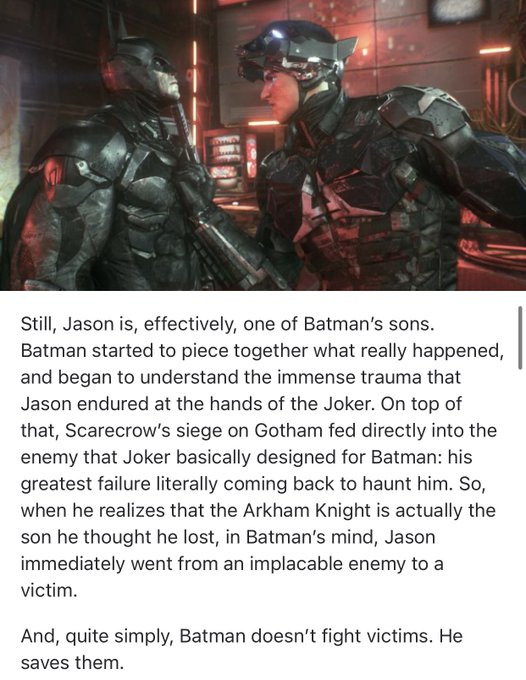
Batman doesn't fight victims. He saves them.
Therefore if Batman is fighting Jason, a victim, he's not acting like Batman. I'm also fine with Arkham Knight being an Under the Red Hood retelling because it's a different story. Comics do this all the time, different universe versions, popular storylines adapted into different mediums. It also works as a commentary on the original story, by showing what Batman could have done to lead to a more positive outcome it makes Batman's choices in Under the Red Hood worse and more tragic because he could have saved Jason, there was still a chance.
So here we have two flawed tragic heroes who are meant to be both pitied and condemned for their actions. One of them is all pity with no condemnation. The other is both pity and condemnation, Batman is grieving, but also he's failing his responsibility towards Jason. Therefore one protagonist works, the other fails utterly.
I'm not saying abusers don't deserve redemption. I'm not saying Enji should have died in order to atone. I'm not saying that the underlying problem with the arc is that they decided to make Enji sympathetic and a focus of the arc. The most important problem is the breaking of one of the fundamental rules of storytelling: Show, Don't Tell.
The Tragic Villain
Not only does The Hellish Todoroki Family plotline fail to make Enji a compelling protagonist, it also fails it's biggest victim. Now, these are both stories that end with the hero failing to save their victim. So if both of these stories have the same ending, why am I saying it failed Dabi, but not Jason?
Well, let me explain.
Dabi and Jason are both villains turned victims. The stories themselves are about this ambiguity. How much should the be held responsible for their own choices? If they are actively harming innocent people, then shouldn't they be stopped? Should they be automatically be forgiven just because of the pain and grief they've suffered, even if they've been causing it to others?
Both characters are also reflective of their fathers because they are too being selfish in their grief, they want their grief acknowledged and so are violently lashing out.
Jason and Dabi both make plays at being vigilantes at first, Dabi wants to inherit Stains will, and Jason Todd wants to be a better bat-man by taking control of the drug trade in Gotham and cutting crime down by executing gang heads. However, neither of them are being honest with this and it's shown through their actions, both of them abandon their original plans.
In the final showdown all Toya cares about is facing Enji on the battlefield, and when he's on the brink of death his mind erodes to the point where all he can do is scream for Enji's attention while his flames get hotter and hotter.
Let's take about Jason first and how his narrative treats him a whole lot better and more sympathetically, with more humanity than Batman. Jason is still held responsible for his choices, he is criticized by Bruce for murdering gang leaders and passing it off as justice. He's also blatantly shown to be a hypocrite. My favorite scene from Red Hood: Lost Days, the official UTRH prequel.
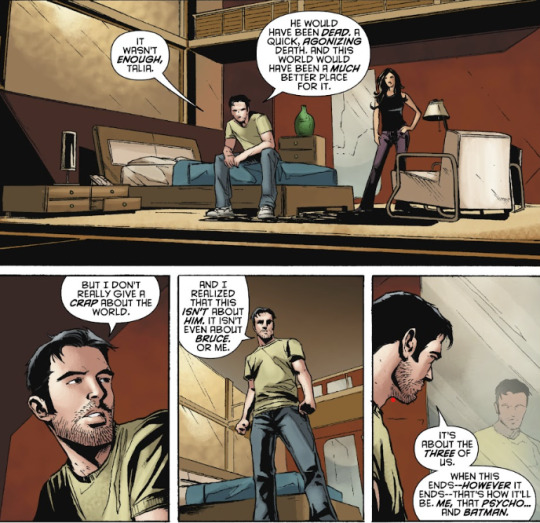
"I want to kill the joker in a cool way. Just sniping the Joker from a rooftop isn't dramatic enough for me."
This scene, and the final scene of UTRH underlines Jason isn't executing criminals because he believes it's the right thing to do, or because of his stated motivation that killing the joker would prevent more future victims.
Instead his every action is to set up a scenario where he makes a selfish demand of Bruce. He wants Bruce to prove to him that he would choose him over being a hero, by setting up his final scenario. Him, the Joker, and Batman. Jason will shoot the Joker. Bruce has a gun. He can either choose to let Jason kill the Joker, or kill Jason to stop him, either way it makes it clear what Bruce's priorities are.
The underlying reason for this is similiar to Bruce. Just like Bruce, Jason is deeply afraid that Batman doesn't love him. That he thinks of him as a failure. (This is Toya's main reason too).
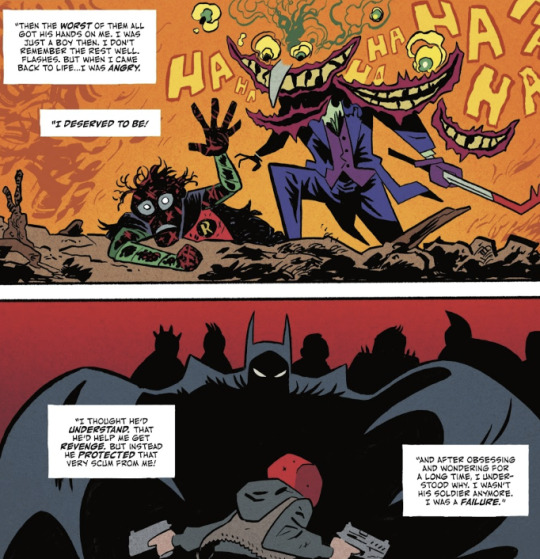
He also interprets Bruce's failure to avenge him to mean that Bruce didn't even care enough to mourn him. If Bruce loved him enough, he'd choose him over the joker, but he's so afraid that Bruce doesn't love him enough that he's going to force Bruce to choose.
Along the way he's also going to behead several crimelords in order to put an exclamation point on that point.
The way Jason completely unravels in the confrontation shows this insecurity, he begins with monologueing about how batman should totally kill people, until his fear that he wasn't important enough, and his grief at losing his father is revealed.
Batman: I know I failed you, but I tried to save you. I'm trying to save you now. Jason: Is that what what you think this is about? Your letting me die. I don't know what clouds your judgement worse, your guilt or your antiquated sense of morality. Bruce, I forgive you for not saving me. Jason: But why on god's green earth is he still alive? Ignoring what he's done in the past. Blindly, stupidly disregarding the whole graveyards he's filled with people. The friend's he's killed. I thought killing me - that I'd be the last person you ever let him hurt. Jason: If it had been you that he beat to a bloody mess. If it had been you he left in agony. If he had taken you from this world. I would have done nothing but search the planet for this pathetic pile of evil, this death worshipping garbage, and sent him off to hell.
Direct statement, it's irresponsible of Bruce to let Joker live after killing Jason and should have put him down to prevent future victims. Reading between the lines, Batman not taking revenge for Jason is a sign that he didn't love him enough, Jason loves Batman more because he would have taken revenge.
As the confrontation continues and Jason's mental spiral worsens, to the point where he can't keep up his pretense of self-righteousness.
Jason: I'm not talking about killing cobblepot, or scarecrow, or riddled, or dent. Jason: I'm talking about him. Just him. And doing it because...he took me away from you.
The father had lost the son, and now the son had lost the father.
Jason's revenge is just a cover, for his grief at losing Bruce. I think this also shows a really positive aspect of Jason's character to humanize him instead of condemning him for his actions to ignore or even justify the suffering he endured: Jason really loves Bruce.
I mean how meaningful is the statement: "Bruce, I forgive you for not saving me."
Bruce has been afraid to hear the whole time that Jason hates him, that he won't forgive him, but Jason loves him deeply. In fact his love is almost equal to his rage because Jason is a deeply emotional person, and these little details make him human and not just like a plot obstacle that Bruce has to face. A metaphor for his past failures.
Dabi is drawn as a crying boy who wants comfort, Jason is shown to be a crying boy who wants comfort through both dialogue and action without us directly needing to be told. It's a heartbreaking line and doing it because he took me away from you and it lands perfectly because the narrative wants us to just look at Jason's grief. It doesn't add an asterisk* even though he was in pain, he's done unforgivable things that can't be justified to undercut Jason's suffering.
In fact that might be another underlying problem with The Hellish Todoroki Family, the narrative tries too hard to make you feel a certain way instead of just presenting things as they are to make you come to your own conclusion. UTRH doesn't support Jason's revenge based serial killing of villains. It doesn't say he's justified to cut off the heads of mobsters. However, it doesn't excessively state "Well, I'm really sorry what happened to you but what you've done can't be forgiven" so we don't have to challenge ourselves to feel too much empathy for Jason's suffering.
Meanwhile even when Toya tries to express his rightful anger and grief, we're always met with someone shutting him down and saying well yeah, but you're wrong, involving innocent people is unforgivable.
As said by @stillness-in-green in the replies to this post:
I think so much harm (in-universe, but the state of the Twitter fandom makes me think the messages are pretty toxic irl, too) comes out of portraying the Heroes as needing to weigh in on the *morality* of the Villains' actions before they gauge "saving" them, when that is not a thing that glorified cops have any business thinking they have the right to do. Demanding repentance before the rehab is so bizarre.
You can say someone's actions are wrong without using it as a factor to consider whether or not their suffering as a human being should be acknowledged, and like I said there's multiple instances of people just yelling at Toya how immoral he is instead of addressing the elephant in the room.
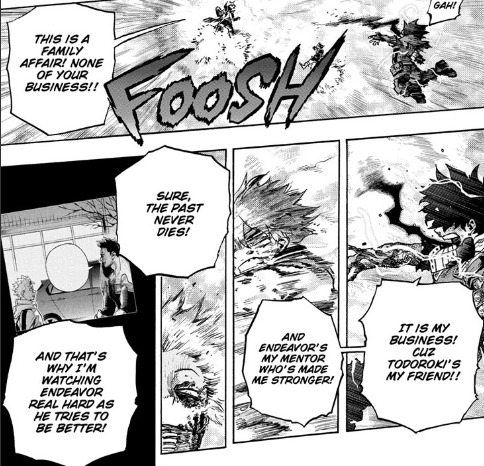
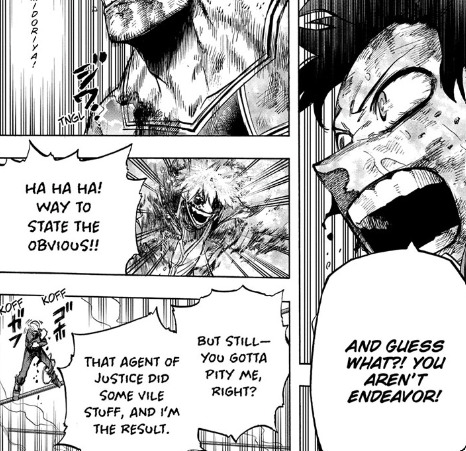
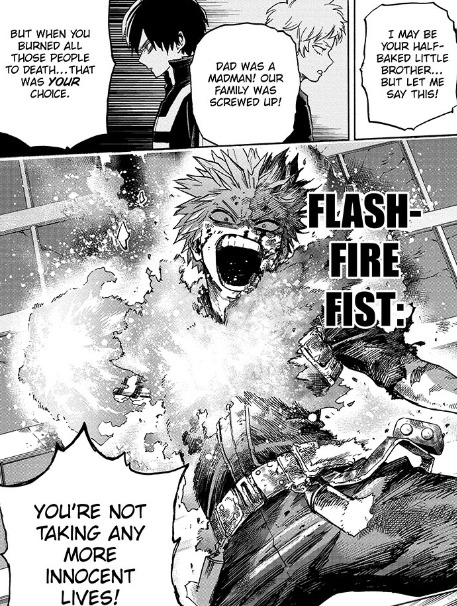
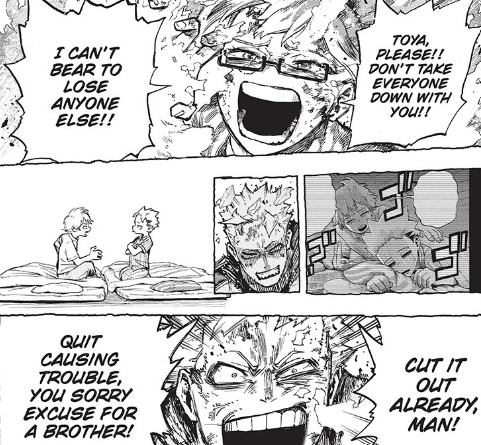
You're wrong, you're wrong, you're wrong, you're wrong.
(Okay, I understand that some people have interpreted this as a show of Honnae and Tatamae, the Todoroki's who are a very repressed household are finally talking about their feelings even if those feelings are selfish and ugly).
(I'm not criticizing Shoto for saying that the people he killed were his own choice necessarily, Shoto is a character who's actions need to be read more deeply than his words he was dedicated to bringing Dabi down without him burning himself any further start to finished. My criticism lies in the fact that Hori uses Shoto as a mouth piece because he thinks we need to be reminded that murder is bad).
However, even acknowledging that time and place man, time and place. They couldn't have done that in the aftermath, when Toya isn't burning to death?
Hey buddy, you're being selfish.
Toya: AHHHHHHHHHHHHHHH I'M MELTING, I'M MELTING.
This is I feel the underlying problem with the way the arc is written, not because the Todorokis are a very traditional Japanese family and there are cultural reasons they express their emotions differently, I'll give a caveat to that it's a nuance I might not understand.
However, I am arguing the actual problem is tell don't show. Horikoshi thinks that we as an audience need to be told multiple times that murder is bad, and we cannot be trusted to interpret that on our own.
Under the Red Hood shows both sides of Batman and Jason's debate, and let's us just come to the conclusion that Jason is in the wrong because revenge isn't justice. Horikoshi reaches no shit sherlock levels of telling us that we're not supposed to approve of Dabi's murders.
it's also a matter of giving Dabi narrative space to express his feelings, like every time Dabi tries to talk he is continually shut down (Shoto does engage Dabi talk to him and listen to why he didn't come back though I'll give him that) and it seems to be to push forward this weird idea that you shouldn't sympathize with the pain Dabi has endured or the ways he's dehumanized unless he does something to prove he deserves to be treated like a human being first.
Jason gets to monologue and make an entire argument, and his argument also shows the depths of his love for Bruce and what a deeply feeling person he is, and how those feelings being hurt and twisted could logically lead to his lashing out.
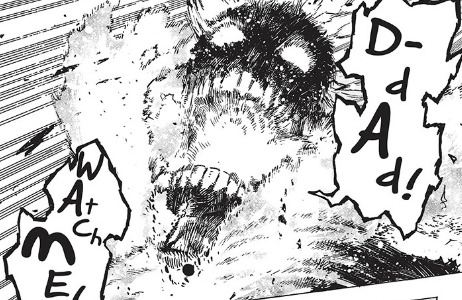
Compare this to Dabi who doesn't get a final monologue, but is instead reduced to a completely mindless state where he just cries out for his dad's attention. He doesn't get to make his argument.
Jason and Dabi both choose to blow themselves up, but Jason gets enough character agency to show this is a deliberate choice he's making even if it's the wrong one. He retains his character agency and ability to make decisions until the end of the narrative.

Jason's also you know physically crying. The end result of the narrative is about wrong choices that both Bruce and Jason make together, and then suffer the consequences together. Bruce watches the same failure play out again and he isn't able to save Jason, Jason doesn't get what he wants, he doesn't get revenge and he doesn't get to reunite with his father. It's tragic for both of them, and brought about by decisions both of them made.
Whereas yes Dabi makes a lot of bad decisions leading up to the last war arc, but in the end his final fate is up to a choice Enji made to not face Toya in the final battle.
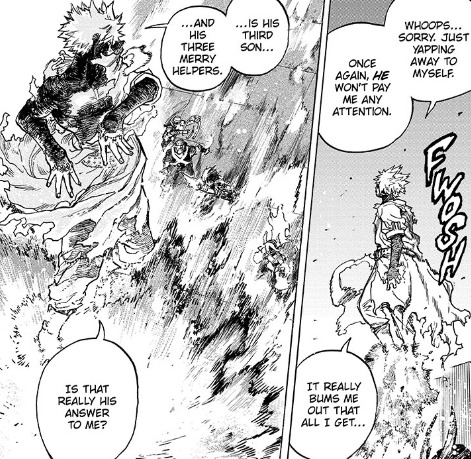
However, while the final consequence of the battle is brought about more by Enji's decisions than Toya's, it's Toya who endures all the suffering and punishment. It's Toya who is in an iron coffin, and doomed to slowly and agonizingly die with all of his skin burnt off unable to move. Toya doesn't even get agency after the arc is over. Enji still has a wheelchair, Enji can still move around, Enji's still fucking rich, he's not in prison for his actions, he as Rei wheeling him around.
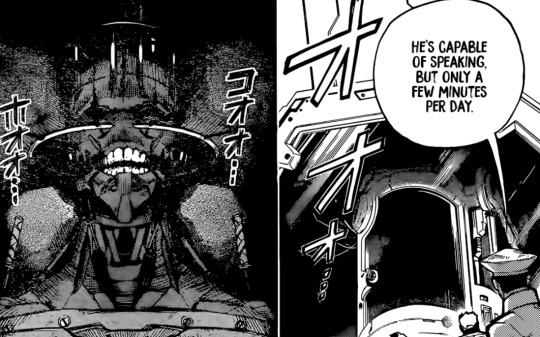
Toya's agency and choices are all taken from him, presumably to serve the plot purpose of making Enji save him to finish off his arc, and then ENJI DOESN'T EVEN SAVE HIM.
Also I think it's important to mention, Bruce's tragic ending is brought about by him attempting to save both, trying to save the joker and Jason with the same action. Whereas Enji's tragic ending is brought about by Enji NOT LIFTING A FUCKING FINGER TO HELP. Yet, it's Dabi who has the lion's share of suffering, and is sentenced to this horrific state of being skinless in an iron coffin and only being able to be awake a few minutes a day with no choice but to waste away.
Bruce is also immediately called out for his actions, by the Joker of all people, you handled this all wrong, it's your fault. Bruce is right to not kill the joker, killing the Joker would not have solved any of Jason's problems, but the fact that he put off facing Jason for so long, and his inability to communicate that he loves Jason is what leads to Jason thinking that the only way to prove Bruce loves him is to force him to choose. It's because Bruce has utterly failed to show him in any other way that he is loved.
Joker: Oh my god, I love it! You manage to find a way to win, and everyone still loses. I'm going to be the one who gets what he wants tonight, badda bing, badda boom."
I'd also like to add that a lot of agency in Enji's actions are taken away too, to make him look more blameless. It's not Enji's fault that he didn't say anything to Dabi during Dabi's dance, he passed out because he had a punctured lung. It's not Enji's fault that he spent a month protecting Deku instead of searching for Toya, he had to protect innocent people. It's not Enji's fault that he didn't go immediately to face Toya in the final war arc Hawks told him not to.
It's not Enji's fault that he made Shoto and Toya fight like Pokemon instead of cleaning up his own mess, and also he feels really sorry for it and as soon as he's done punching the bad guy he'll look after Toya he promises.
Enji does get called out for this behavior but it falls flat because it only comes from the villain AFO, and Toya himself. As I stated above too, the ending is more influenced by Enji's actions not Toya's (because Toya's agency is stripped away until he's mindless) but Toya is the one who has to die while Enji gets to live and atone.
That is the real sticking point for The Hellish Todoroki Family, the way it ends.
Themes Are For Eight Graders
The underlying problem with the whole arc and why The Hellish Todoroki Family fails as a tragedy, is because it wasn't written to be a tragedy.
The above quote is from an interview with the writers of the widely hated Game of Thrones Season 8, which took a sudden tragic turn for Dany's character, gave her an incredibly dehumanizing ending of being put down like a rabid dog by her own lover, an ending that was neither foreshadowed nor did it match with anything written before.
In this meta here by @hamliet it goes far more into depth that Game of Thrones isn't a tragedy, but a piece of Romantic fiction (not a love story, Romanticism is a genre of big emotions, the beauty of life, larger than life ideas hence why it fits well with fantasy genre, it can be sad but it doesn't follow tragic structure).
Dany is a romantic heroine, a deconstruction of the idea of the classic warrior princess trope, and you know a colonizer, but she's not meant to be written as an inherently bad person. There are people who say that Dany was going to die in the original books. I'm one of those people. Me. However, context and framing matters, Dany for all her colonizing ways does genuinely want to do the right thing, so it's likely she'd die a heroic death as a reflection of her selfless intentions (and intentions do matter for fictional characters) whereas in the show she's put down as a villain.
Now watch me I'm going to coin a term for future literary critics to use: Narrative Gaslighting.
Narrative gaslighting is different then Show Don't Tell, where an author has just failed to properly show what they're trying to tell you in the story. Narrative Gaslighting is when a narrative deliberately tries to mislead you, straight up lies to you, or just insists things that did not happen totally happened guys. Much like real gaslighting, Narrative Gaslighting makes you feel stupid for interpreting things a certain way and insists you were wrong all along.
Narrative gaslighting is when Tyrian gives a speech that everyone should have suspected Dany when she burned slavers alive that she was secretly evil and would one day turn on them.
Like, no.
Dany is flawed because she is a foreigner, interfering with the politics of a different country that she does not understand in order to gain enough resources and men to return to her home country and invade that country to exercise her right as a Targeryn to uphold the divine right of kings.
Game of Thrones doesn't mention any of that shit that's in alignment with the previous actions in the story, it's just insisting the very ableist notion that Dany was insane all along and her violence towards other people is the result of her mental illness.
(Also before anyone says, so if she's a colonizer than how can she have good intentions, everyone is Bad in Game of Thrones, they're all waging war to vie for a throne, monarchy is bad guys. IDK how to tell you that Game of Thrones has gray on gray on gray on gray morality).
(Also this aside ties into the hangup of MHA and most popular fandom culture on Twitter, that Dany's moral failings somehow disqualify her from her humanity. In spite of the fact that on top of all of that she's a rape victim, and like, Dany's only on that continent in the first place because she was sold as a bride.)
But here's the same weird subtext that Horikoshi's writing of Dabi. The fact that Dabi was continually victimized and denied human dignity does not need to be addressed, because he did the bad things and didn't atone properly enough for it first.
In essence this random post on the gunnerkrigg court forums I found on the same day the chapter came out, displaying apollo's gift of prophecy.
"When someone is persecuted, it's important to inform everyone about their flaws. That way you don't have to feel anything about all the times that they were denied human dignity."
So, Dany is not written as a tragic hero but a romantic one, we as an audience are both meant to acknowledge her flaws and sympathize with her, not demonize her in an ableist way for being insane, and even if Dany is meant to die the tragic way she dies does not match up with all of the narrative foreshadowing that was built before that.
Like, for instance a lot of POC after the show ended kept telling everyone that Dany's actions in a foreign country were seriously problematic, and not only did the audience not listen but the showwiters didn't acknowledge it with the same subtlety as the books. So those people especially were able to pick up Dany's character flaws, and when the show finally acknowledged them it's not even in the way that critiques of the show were pointing out Dany's flaws it was just "she was insane all along." Not like taking time to go "no matter what the intention, interfering with the politics of a foreign country is wrong."
The problem with the Todoroki arc is essentially the same, down to the ableism (because outsiders continually call Dabi either a maniac or insane Demon without even giving credence to his grievances about hero society he's just reduced to an insane fringe element of society, and Dabi himself is reduced to a completely mindless, childish, insane screaming state where he can't make active decisions).
The Todoroki Arc is not set up to us as a tragic one. The ending is pretty clearly telegraphed to the whole audience. People are not wrong for thinking that Toya's ending would be either rehabilitation like Rei with the eventual hope of being welcomed home, or some kind of house arrest where he still gets to be with his family.
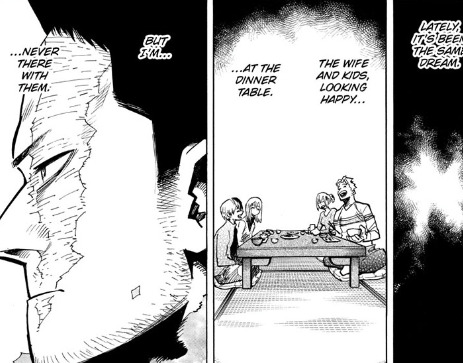
Everyone happy at the Dinner table and Enji not sitting with them.
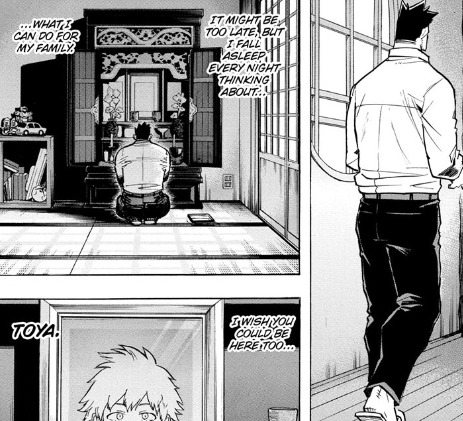
"I wish you could be here, Toya."
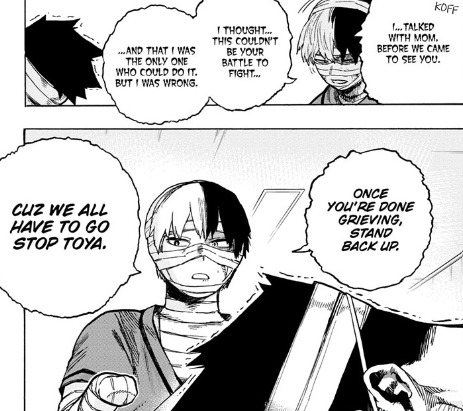
"We all have to go stop, Toya."
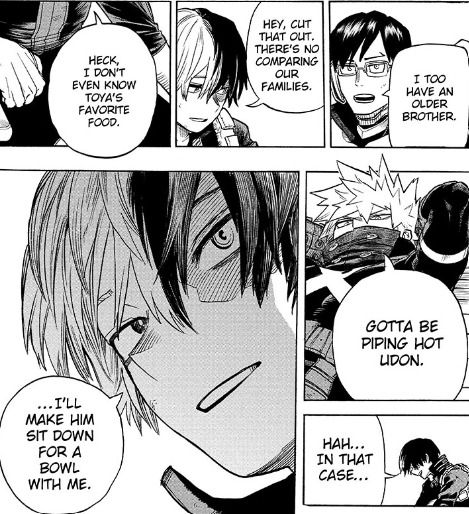
"In that case, I'll make him sit down for a bowl with me."
Even Shoto's efforts to take down Toya non-lethally are rendered completely pointless, because Toya gets back up again and then burns himself alive (completely by his own choice so no one has to feel bad that they failed).
The story sets up the expectation that Toya is going to be brought home and sit down for a meal with his family. Then it makes you feel stupid for going in an entirely different direction. It was always going to end this way didn't you know The Todorokis are a tragedy?
Well, I just spent a very long section of this thesis statement illustrating that if it's supposed to be a tragedy, then it's still not written well.
It's a written as a romantic story of a family healing, and the villain getting saved, only for the villain not to be saved and the story to just keep on going like not getting saved isn't a huge failure. This is something that should permanently destroy the main characters, that they got the chance to repeat Sekoto peak and be there this time and they all utterly failed. I feel bad for Shoto most of all because he did everything right, and he still loses his brother, but does the story show that?
The problem is the story is blatantly lying to you about the fact that Toya was somehow saved, even though he LITERALLY LOOKS LIKE HELLRAISER. To quote Codenamesanzanka again:
But I feel the story couldn't give us that because it will remind the reader and everyone just how much Touya will be missing. In-story, talking any more will overburden Touya's heart - and how apt is that metaphor? So let's talk about how we'll talk, but that's all that's allowed here for this scene. Else we'll see how unfair it is that Touya has to be confined to this room, he isn't with his family and they have to come to this prison just to tell him about their day, and soon he will be gone. Details make it real, and it would've exposed the lie that Touya was saved in an actual way. The story knows it too - "this extra time Shouto gave us." This is all 'extra', and not the core. [...] If the story was sincere that this is a case of "it's simply too late" - as it should be!!! imo, to really drive in the clear point that they failed, they did not get the save they wanted, because that's the truth - the tone of the chapter isn't tragic enough for that. The tone is going for 'Making Peace With This'. We've skipped the stages of grief and all we have is acceptance. The characters have accepted this, and so must the readers as well.
Therefore it's narrative gaslighting, the story is making us doubt our perceptions and trying instead to manipulate us to feel a certain way. We don't have to question the unfairness of Toya's fate, because look at all the people he's hurt, and look how Enji is atoning and taking responsibility.
The story builds up the idea that Enji will choose Toya. That he will choose being a father over being a hero. Enji doesn't do that, and it's Toya who suffers the horrific, painful consequences while Enji gets off mostly scott free. Mind you it's also ableist to suggest that being in a wheelchair is some sort of life-ending consequence like he's fine. The story even goes out of its way to say how avoidable this ending could have been if Enji or Rei or someone lifted a single finger to give Toya the acknowledgement he wanted, and then gives it a "Too little, Too Late" conclusion but doesn't acknowledge that this is where it's ending and instead tells us that Enji has successfully atoned.
"Everyone's watching me. So this is what it's like. If it was such a simple thing, then why not sooner?"
If it was going to turn out this way Toya should have just died here, not because death would somehow be a mercy compared to life in prison, but because the Todoroki Family doesn't deserve to get to pat themselves on the back. If they let Sekoto Peak happen a second time, then they should have to deal with the consequences of that.
It would be consistent is my point. This is written as a "Too Little, Too Late" kind of ending, but we don't get the emotional response from the Todorokis that they've let Toya die a second time.
On the other hand, UTRH has the exact same tragic ending but it doesn't make me angry because it's honest about it. The Todorokis let Sekoto peak happen a second time. Batman let Death in the Family happen a second time, but look at how even the narration and comic panels of the story acknowledge it.
"Fate is a funny thing. It swells up like a raging current and we are forced to travel. It provides us no exit. No deviation. It drops us in a bottomless ocean and compels us. We either swim, or drown, and sometimes as we struggle against the tide, a great truth arises."
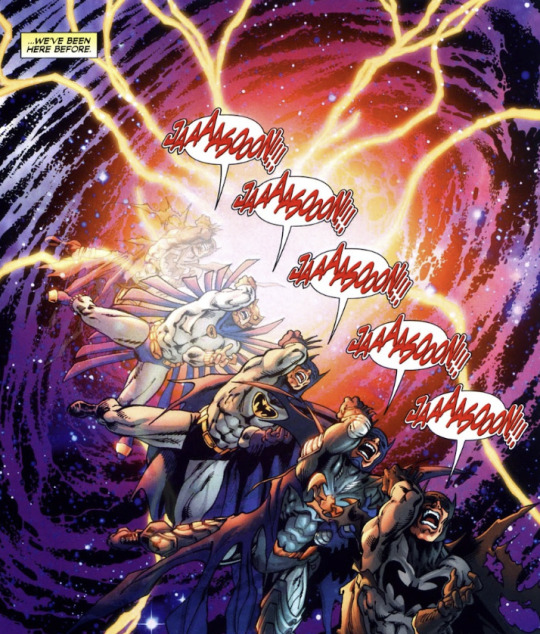
One ends with Enji meaninglessly stating that he'll spend the rest of his life atoning for Toya and watching over him (which I guess will be like two months tops) for the fifth time. The other ends with Batman being lectured by the Joker of all people of how he chose wrong and being forced to watch once again as a warehouse blows up, and he's completely helpless to save Jason.
UTRH ends with the message that Batman sucks, Enji's atonement arc ends with Natsuo calling him cool for atoning and UTRH makes me like Batman way more as a character. Whereas at this point I feel nothing from the Todoroki Family, except for a disgust for the way that Toya not only has to die, but has to die a slow, gruesome death while the rest of his family walks away with the small comfort of "oh at least we'll get to say what we need to say before Toya passes."
Especially with the fact that Toya's greatest fear was that when he died, he died meaninglessly because his family never grieved him and all moved on with their life. I guess we don't have to analyze how gross the underlying message that criminals don't deserve to be sympathized with because themes are for eighth graders.
EPILOGUE
The post is finished but apparently everyone expects me to cover every single possible angle even in posts this long.
You didn't address the cultural aspect. Under the Red Hood is a western story, and Todoroki Family is based on eastern concepts.
The post isn't about that. The post is long enough I can't cover every single topic. Here's someone who covered that topic thoroughly. This one discusses more about the nuances of collectivism.
Also, since the Todoroki Family obviously copied Under the Red Hood's homework, it warrants a comparison. Especially since it seems to critically misunderstand what made the original work.
Which is a valid form of Literary Criticism, as Ursula K Le Guinn once said:
It doesn’t occur to the novice that a genre is a genre because it has a field and focus of its own; its appropriate and particular tools, rules, and techniques for handling the material; its traditions; and its experienced, appreciative readers—that it is, in fact, a literature. Ignoring all this, our novice is just about to reinvent the wheel, the space ship, the space alien, and the mad scientist, with cries of innocent wonder. The cries will not be echoed by the readers. Readers familiar with that genre have met the space ship, the alien, and the mad scientist before. They know more about them than the writer does.
The Todorkis aren't all to blame for Toya. Natsu, Fuyumi and Shoto are innocent:
You're right. It's just easier to refer them as the Todorokis then specifying "Enji and Rei" each time.
You didn't mention Shoto once in this post:
I have no cricism for Shoto's role in all this. In fact I think he's the best written part. I praise it here.
Shoto is a good boy, and he deserved to spend more time with his brother. The fact he won't be able to sit down and have dinner of him, is the greatest tragedy of them all.
#mha meta#mha spoilers#mha 426#mha 426 spoilers#shoto todoroki#dabi#toya todoroki#enji todoroki#under the red hood#jason todd#bruce wayne#batman#mha critical#todoroki family
642 notes
·
View notes
Text
ok but hear me out: riptide x slay the princess (big ol yap sesh and closeups below)
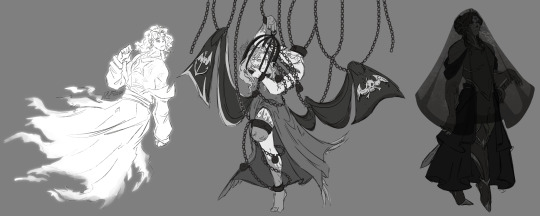
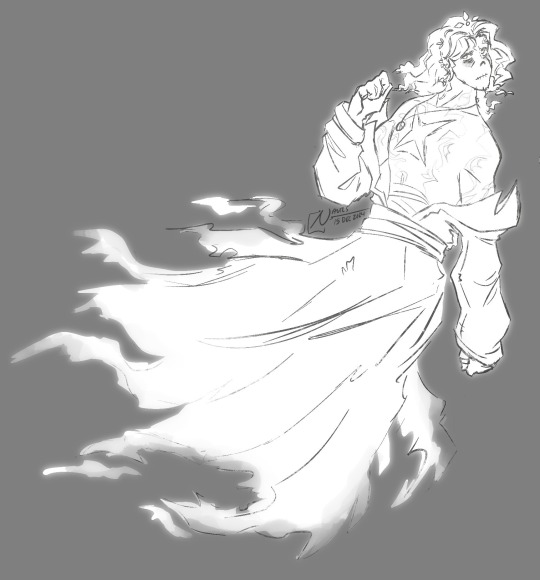
Chip: The Spectre
109, obviously, but also the spectre’s yearning for what once was, wanting back her “freedom” of the life she had before. The parallels between the spectre’s longing and Chip’s longing for his life with the Black Rose Pirates work so well together. Another factor is how Chip needed to learn that he was not alone anymore. He had a crew, friends, captains, siblings. Through his ups and downs, he learned respect, trust, honor, and responsibility; he learned to love again with a fiery passion he had not felt since he sailed alongside Arlin.
“I offer you absolution, and you take my hand in yours.
You felt the pain you caused another, and you were willing to sacrifice everything you thought was you to set me free.
Without sin, there is no redemption.”
“This one is vaporous. She is a dream of a life she could never have, but that longing has given her so much capacity for Kindness. She will make for a yearning heart.
Do not mourn her — she will finally be able to hold What she never knew.”
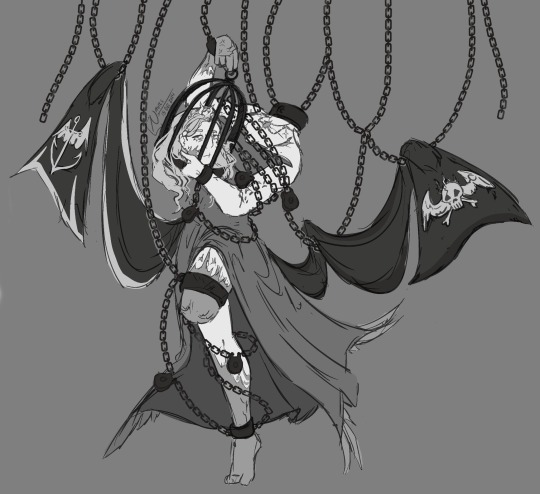
Jay: The Cage
I was heavily debating between Jay and Gill for this one, but the Cage’s final confrontation is what sold Jay for me. Her constant fear of abandoning her blood family because she has already lost so much (her sister, and soon her mother), that abandoning the last shred of family she has left would be losing everything. It is her inaction which drives much of her conflict, balancing the line between Ferin and pirate, because no matter which side she turns to, she is always afraid, because she always has something to lose. There are times where she feels like she can only watch from afar and see what will happen (especially in the case of lizzie’s war), but she must understand that inaction is most often a deficit. She has proven herself time and time again to others, she just needs to prove it to herself.
“Fear is a chain around the neck and a needle in the eye.
It was fear that made our prison, and it was fear that told the lie that
our spirits were not free to choose.
But together we left it all behind, and found a world free of burdens.
We found the beauty in accepting our dance.
This construct is a machine of fear. It has no place in our divine hearts.
Shatter it. Leave with me.”
“This one is a body that convinced herself she was only a set of eyes. She will make for a watchful heart.
Do not mourn her. She is now what she wished that she could be.”
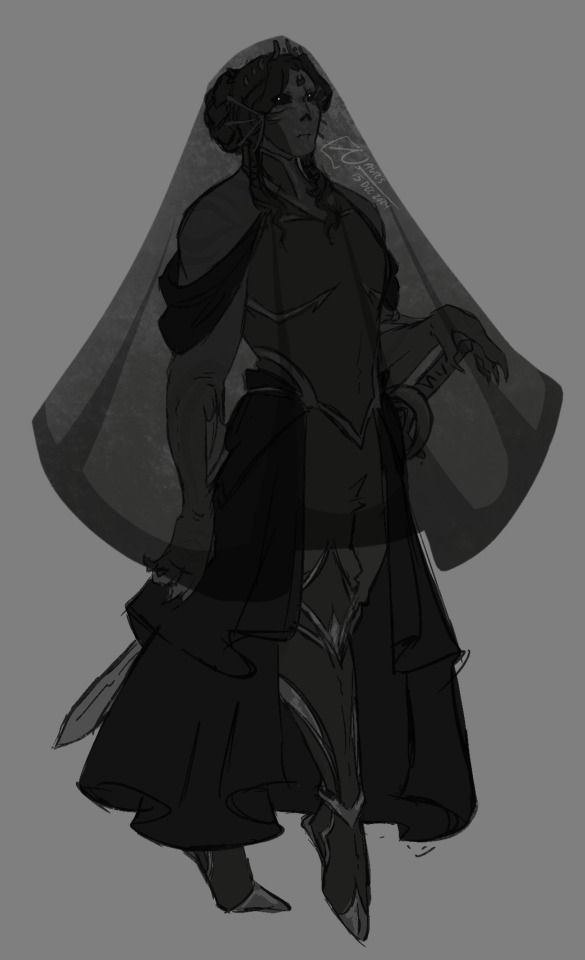
Gill: The Drowned Grey
Unlike the others, I couldn’t really find a princess that fit gill as well as the others did, so I decided to do a more specific moment of gill’s story for his princess: his oath of vengeance and dunjon arc.
The Drowned Grey is a story of hurt, loss, and rebirth. Gill loses everything; his friends, his closest companion, and is taken away from the life he once knew to be trapped in an endless white void, to be judged by the apparitions of those who had always judged him before. He is raw, violent emotion, rage being the only way he knows to understand his pain, and thus inflicts it onto others. His actions endangered those who wanted to help him be because all he could process was his loss. And that loss he screamed at the elder’s with his entire soul, only to be swept away in the dark depths of Niklaus’ control. But after the anger, was his rebirth. He was never meant to remain in an endless void for eternity, and Born anew in the eye of a leviathan’s storm, the violence and grief was left behind him in the cold icy storm. He had his catharsis, leaving those demons behind him in the darkest depths.
“I kill you. You kill me. Back and forth we go, faster and faster and faster. I kill you. You kill me.
Hollow eyes watch from the dark corners of a forgotten place flooded by emotions left unspoken. The tide rises.
I kill you and me.
An ending is a passion that can only be expressed with a moment in time. It is a seed for a new beginning. To linger on an ending is to rob it of its life.
And without me, all that's left to do is linger.”
“This one is guarded sorrow. She saw herself as alone but in the end had courage to share with another. She will make for a deep heart.
Do not mourn her - she has finally been heard.”
anyways uhh thanks for coming to my tedtalk, i lowkey wanna do this for other campaigns, currently thinking about prime defenders and the suckening so ye 👍👍
#to everyone in riptide hanout i was yapping to about this thanks for bearing with me lmao#i love slay the princess sm <3#jrwi#jrwi show#just roll with it#jrwi fanart#jrwi riptide#jrwi gillion#gillion jrwi#jrwi gill#gillion tidestrider#jrwi chip#chip jrwi#chip nolastname#chip james#jrwi jay#jay jrwi#jay ferin#slay the princess#stp the spectre#stp the cage#stp the grey#hangout* too lazy to rewrite all the tags again lmao
276 notes
·
View notes
Text
Long dead contractor or fake one ?
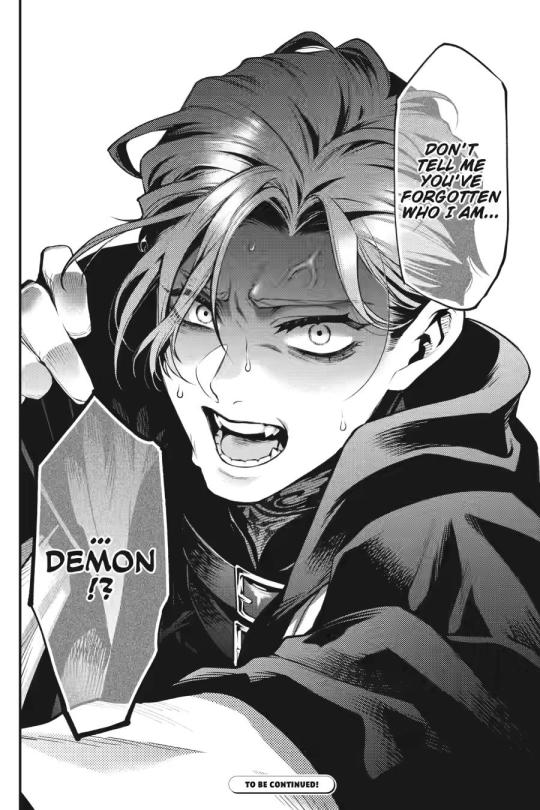
Thinking again about this guy ^ who probably isn't the Polaris Star Lord (because Polaris from ch169 doesn't have the similar neck tattoo thingy).
Crack theory from my insomnia : the thing is, we know UT checked Seb's cinematic records during the Campania arc and thus knows what contract Seb made with Ciel (i.e the 3 rules from ch138)...
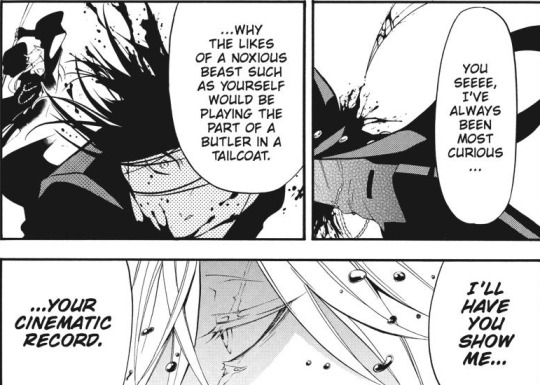

...the remaining question though is whether he saw more than what we readers saw of Seb's CR.
When it comes to humans, their cinematic records start at birth and end at death. However, we don't know enough about demonology in Kuro to be sure
whether Seb's own CR only begins at his current summoning,
or if he has centuries old CR depicting his entire existence as a demon and thus all his previous contracts.
Depending on the answer, this means UT could have seen just Seb's existence since being summoned by our!Ciel, or also past contractors. Noteworthy, when Grelle briefly checked Seb's CR during the JTR arc, she too only saw moments of Seb's "life" as Ciel's butler.
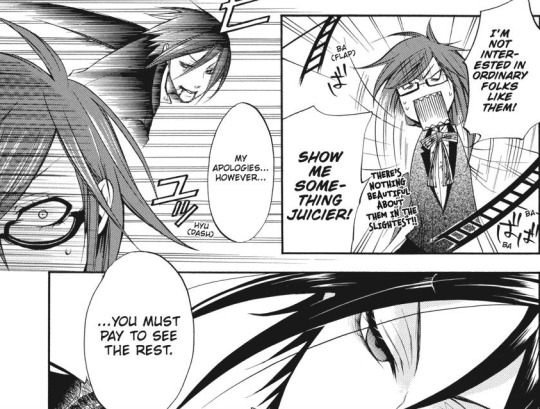
So, if UT had access to Seb's memories of previous contractors, then he could have somehow found this guy and brought him back to life (somehow finding his corpse where Seb ate his soul, idek).
However, if UT didn't have access to Seb's CR before the current summoning and contract with our!Ciel, then the question remains : who is this guy from the cliffhanger and how did he end up involved ?
Considering UT's goal of separating Ciel from Seb...
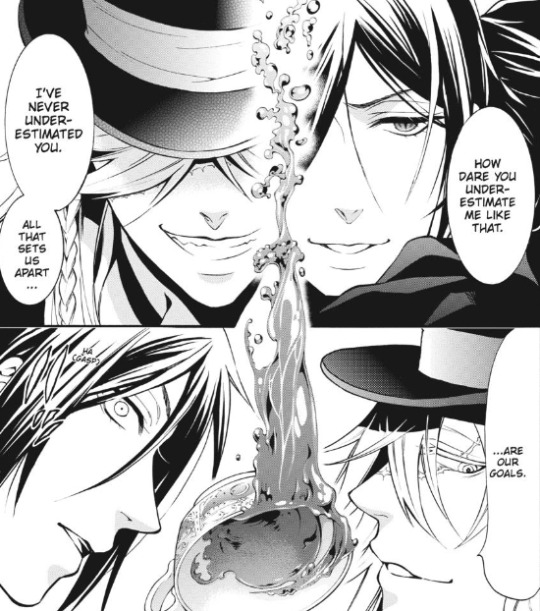
...if UT had no way of finding a previous recent contractor and bringing him back to bizarre doll state, what if he faked one ? After all, he doesn't have to play fair when it comes to fighting against a demon.
Seb's contract with Ciel is based on the 3 main rules they discussed during ch138. Namely in that chapter, Seb and Ciel discussed the matter of possible betrayal and...
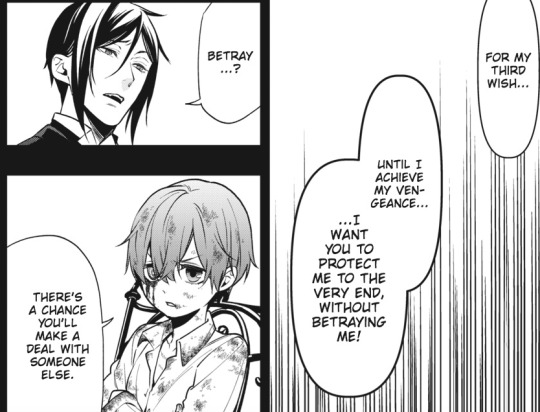
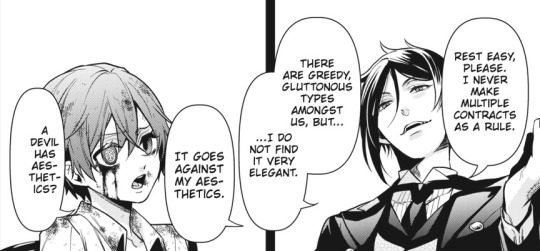
...while Seb said that multiple contracts were against his aesthetics, UT could have taken a corpse and altered his CR (by adding fake memories, like he did with the Campania BDs) to trick Ciel into thinking Seb broke their agreement of no multiple contracts, thus rendering the contract null.
This would explain the whole "would you like me to give you a hand ?"

And "then why did they welcome us ?"
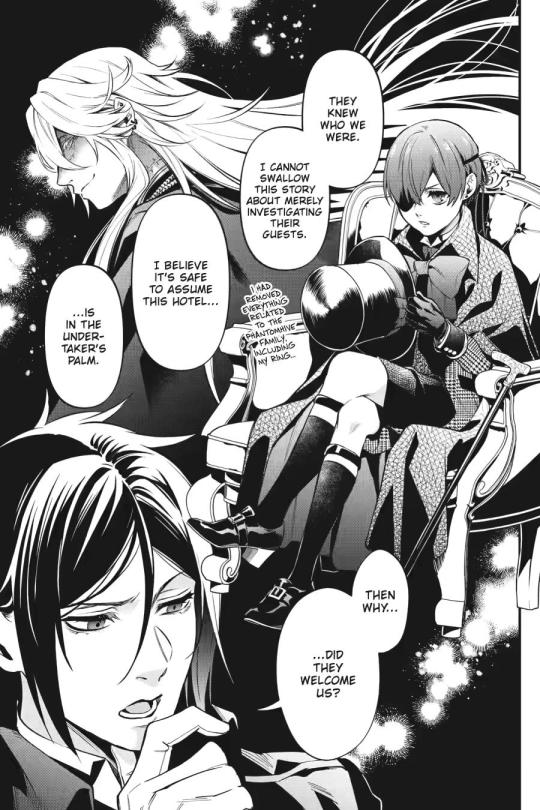
Now, for anyone who might come at me saying "but Ciel would never believe such a thing" : I understand the feeling since Seb is indeed too stupid to betray his own aesthetics, but I beg to differ considering the Green Witch arc, the "90% serious" incident and mostly the fact that...

...Ciel doesn't trust that Seb has his best intentions in mind, far from it.
It will take convincing arguments for sure, but UT is not some ordinary villain and, again, the Nectar Springs Hotel staff was expecting them. Lastly, considering the theory that UT could be Cedric K. Ros, Frances once said in ch14...
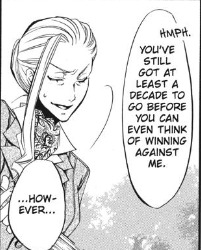
...and I think it could apply to UT as well.
I mean, so far, the Campania, Weston and Blue Sect arcs saw UT winning every time. As for the current investigations, Mey and Bard were successful but Finny & Snake weren't, meaning that if Ciel & Seb lose, it's going to be a tie (which would keep real!Ciel longer in the story).
Maybe this arc will highlight that Seb was right in ch14 and our!Ciel can't win against UT and his brother if he doesn't add more Phantomhive brains to his side (aka Frances becoming some sort of mentor like Seb mentioned) :
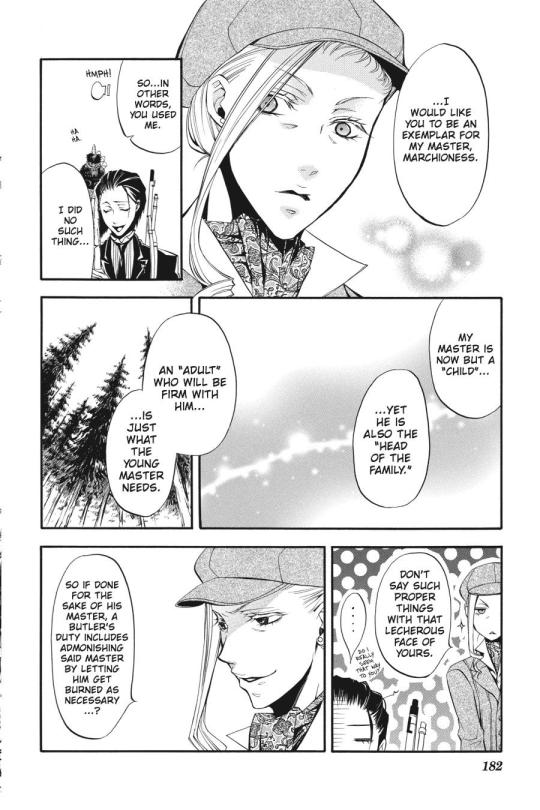
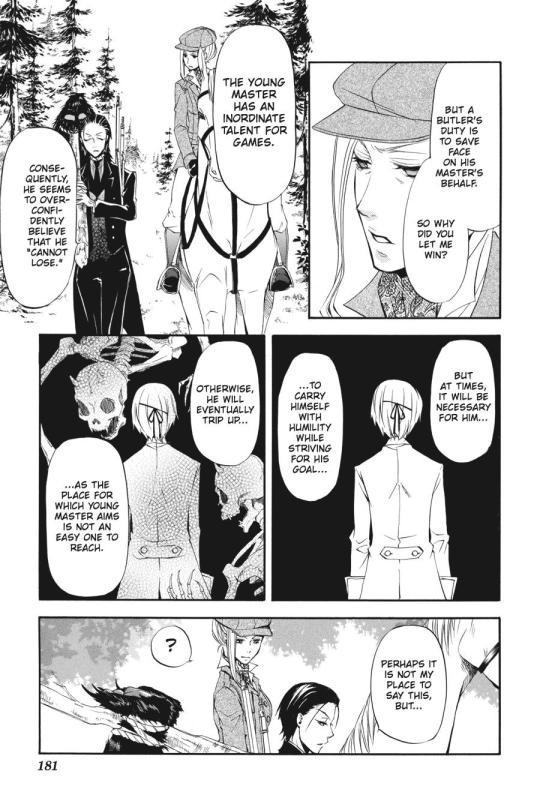
TL;DR I don't know if Seb's past as a demon before the contract with Ciel could be relevant to the plot, so I wouldn't put it past UT to create a fake contractor to try and make the contract with our!Ciel null.
UT doesn't know how to mourn but he does know how to hatch conniving plans.
#kuroshitsuji#undertaker#ciel phantomhive#sebastian michaelis#frances midford#blue revenge arc#kuroshitsuji theory#kuro214#imagine UT interviewing people for this massive plan : as far as we know this guy is an actor#just like Bravat was a failing diviner who ended up leading a cult#my analysis
127 notes
·
View notes
Note
Hello, I am wondering if u take request for a Tony Stark x female reader, who is also best friend of Tony Stark before he came Iron Man but she has been by his side through everything as well. But it’s a fluff one shot as at the end where they both reveal their feelings for each other which they had from the moment they met and they have their first kiss between them as well.
Ofcoursee, here it is! Hope you like it :)
Virtual Insanity

Summary: In which the infamous line "make love not war" isn't well-respected by this pair of friends. When cyberbullying at Stark industries level develops into a game between these two collegues and friends, something more begins to unravel between the two.
Word Count: 1.7K Warnings: none except Tony's unsufferable ego (all jokes)
A/N: This is a short oneshot. Might turn into more. I'm also still working on the "Soft in the right hands" series for bucky so stay tuned!
You’d known Tony Stark long enough to remember when he didn’t wear the suit — physically or emotionally.
Back then, he was all sharp smiles and sharper intellect, more interested in building arc reactors with cocktail napkin schematics than charming investors. Reckless with nearly everything except the way he treated you. Somehow, against all odds, you’d slipped past the velvet rope that guarded the real him — the sleepless inventor who showed up on your fire escape at 3AM with a bottle of Scotch and a theory about thermal diffusion that couldn’t wait till morning.
You were best friends before Afghanistan. Before Iron Man. Before Stark Tower had its own AI department and a floor reserved just for “Tony’s regrets, part I through XXV.”
And none of that stopped him from hacking your firewall during lunch.
You were approximately three minutes into a well-deserved lunch break — grilled cheese in hand, Spotify playlist on shuffle, and the sanctity of a lab entirely free of explosions — when your firewall went up in flames.
Digitally speaking.
The code on your main monitor began to twitch. Literally twitch. Then twist. And then it smiled at you. A little pixelated smiley face blinked up from the line of code you’d just written, followed by a dancing ASCII cat wearing sunglasses.
“Oh my God,” you muttered, setting your sandwich down like it had betrayed you.
You knew that coding style.
You knew exactly who was responsible.
With the patience of a saint and the energy of someone who was one click away from snapping, you launched into the system’s backend, pulling apart the layers of the digital graffiti with expert ease, unraveling each line of smug Stark-ware. And sure enough, right at the root folder, embedded in a hidden command string, was a line of text:
"Nice firewall, sweetheart. 7/10. Would hack again. - T.S."
Your eye twitched. Your soul twitched.
He didn’t just breach your system. He decorated it. That wasn’t a hack — it was a housewarming party in enemy territory.
The man had billions of dollars, a global tech empire, multiple Iron Man suits, and — apparently — nothing better to do than hack into your secure files during his downtime like a caffeinated raccoon with a superiority complex.
You were going to kill him. Slowly. Or worse — give him a lecture so long and boring it could be classified as psychological warfare.
And thus, the war began.
With your jaw clenched and your heart pounding in that very specific, very annoying way it only ever did around Tony, you stormed out of your lab and stomped down the hallway of Stark Tower.
You bypassed three interns and a mildly offended elevator AI before slamming open his door like righteous judgment. Finally, you flung open the doors to his R&D suite without knocking.
Tony didn’t flinch.
Sleeves rolled up, arc reactor glowing, fingers dancing across a holographic interface. He looked up. Grinned.
“Hey, sunshine,” Tony said lazily from behind a table cluttered with open panels, a half-dismantled drone, and at least three coffee cups. “I was just thinking about you."
“You’re a menace.”
“I’ve been called worse.” He finally looked up, dark eyes glinting with amusement. “But usually by people who didn’t bother updating their encryption protocols.”
You crossed your arms. “You hacked into my system during lunch, Stark. That’s below the belt. I was eating grilled cheese.”
“Maybe next time add some brie and fig jam. Class it up a little.” He grinned. “You’re welcome, by the way. I just gave you a free security audit.”
You stared at him, deadpan. “Did your ego eat your moral compass for breakfast?”
He stood, sauntering over like confidence incarnate in a Henley and jeans, and leaned against the edge of the workbench — arms crossed, smirk fully loaded.
“I’d argue my ego is my moral compass. And it always points due north to: mess with you.”
“You hacked my system,” you repeated.
He tilted his head. “If I can break in, so can Hydra. I’m doing you a favor.”
You crossed your arms. “This is the third time this month you've done something like this. Last week, you turned my digital assistant into a sassy version of yourself. I had to argue with my microwave for twenty minutes before it would heat my soup.”
He beamed. “He’s got a personality now! Named him Toasty.”
“I’m going to rewrite your DNA.”
“Only if we cuddle after.”
You were going to scream. Or kiss him. It was a very fine line these days.
“I’m going to kill you,” you said conversationally.
He grinned wider. “You’re going to miss me.”
So instead, you narrowed your eyes and said, “I hope you like Shakespeare just as much as JARVIS does.”
He blinked. “What?”
You pulled your phone from your pocket, already typing."Your little AI pet seems to have brushed up on his Shakespeare, because he’s about to speak exclusively in iambic pentameter for the next twenty-four hours."
“Wait. No—”
“And make all puns food-themed.”
Tony’s jaw dropped. “You’re a monster.”
You shrugged, already walking toward the door. “Some people bake sourdough for fun. I emotionally sabotage billionaire AIs.”
Tony groaned. “JARVIS
, don’t you dare—”
“Verily, sir,” JARVIS chimed in serenely from the overhead speaker, “I find thy attitude rather cheesy, like brie upon a croissant most greasy.”
Tony’s head hit the desk.
You smirked. “Toasty says hi.”

It went on like that for weeks.
Tony retaliated by installing a movement sensor in your lab. Every time you entered, SexyBack blared at full volume. FRIDAY wouldn’t let you disable it. She said it was “legally classified as a morale booster.”.
It was a war.
You replaced his AI’s voice with Gilbert Gottfried reading Twilight.
Tony responded by having your smartwatch shout hourly affirmations about his hair.
You hacked his suit’s startup sequence. Now it greeted him with:
“Iron Man: The Human Hot Pocket. Online.”
It didn’t stop there.
He replaced your screensaver with a live feed of himself winking, finger guns included.
You programmed his coffee maker to scream “INCOMING!” every time it dispensed espresso.
Naturally, collateral damage was inevitable.
Bruce’s tablet was cursed to play Baby Shark whenever opened. He developed a twitch.
Sam’s Falcon gear announced all takeoffs with: “I’m a little teapot, short and stout.”
Steve’s toaster quoted Pride and Prejudice in Cher’s voice.
“It is a truth universally acknowledged,” it belted one morning, “that a single man in possession of breakfast must be in want of jam.”
He punched a wall. You both got fined.
Even Clint, ever the stealthy one, wasn’t spared. Every time he drew an arrow, it whispered “pew pew” in Tony’s voice.
The tower teetered on the brink of chaos.
Pepper threatened to move to Dubai.

It was late.
The Tower was asleep, mostly. Except for Tony, who you found in the R&D lounge, hoodie on, arc reactor glowing soft under worn fabric. He looked… still. A rare moment for a man who moved like his thoughts could outrun time.
“You gonna yell at me for the coffee pot thing?” he asked, not looking up.
“I should,” you said, easing into the seat beside him. “FRIDAY tried to launch a counterstrike when I made a cappuccino.”
“She’s passionate.”
Silence fell. He just stared at you like he was debating something he’d rehearsed a hundred times in his head.
You blinked. “What?”
Tony opened his mouth. Closed it. Then, “Do you want me to stop?”
You frowned. “Stop what?”
“The pranks. The hacking. I mean, I know it’s probably childish and annoying and… I don’t know. Maybe I just like having a reason to see you all worked up, to just see you more.”
You sat back, heart thudding.
“That,” you said slowly, “is the least emotionally articulate confession I’ve ever heard.”
He rubbed the back of his neck. “Yeah, well. I build flying suits, not feelings.”
You stood and walked over, stopping inches from him. His breath hitched, and yours did too.
“For the record,” you said, “I love your flying suits. But I also kind of love… this.”
He blinked. “The chaos?”
“The banter. The sabotage. The way your face lights up when you think you’ve outsmarted me, even though I’m always two steps ahead.”
“Debatable,” he muttered.
You leaned in, lips brushing the shell of his ear.
“And I love the way you look at me like I’m the only firewall you’ve never wanted to break.”
He stilled.
Then: “I’ve been in love with you since the day you fried that Russian botnet and called it ‘a poorly coded insult to my intelligence.’”
You smiled.
And then, you kissed him.
It was messy and hot and gloriously overdue. His hands cupped your face like he’d been dying to do it for years, and your fingers curled into his shirt like gravity had given up and he was your anchor now.
When you finally pulled back, breathless, he whispered, “I should have hacked you sooner.”
You smacked his shoulder. “Shut up and kiss me again.”
He did.
And that night, neither of you changed each other’s passwords.

You called a truce.
Sort of.
Now your prank war has a rulebook and a scoreboard. Nat is the referee. Bruce runs support (begrudgingly). Steve is still in therapy.
JARVIS still speaks in sonnets during thunderstorms. Toasty hosts a podcast. FRIDAY hosts a revenge fund.
A year later, Tony proposed via custom hologram code embedded in your firewall — romantic, glitchy, and absolutely extra.
You said yes.
And now, sometimes, late at night, you’ll find yourselves coding side-by-side, teasing each other like always — except now, there’s no more pretending.
Just love. Loud, messy, sarcastic love. With bad lighting, too much coffee, and more happiness than either of you thought you’d ever deserve.
And every morning, when you walk into the lab, “SexyBack” still plays.
You don’t stop it anymore.

A/N: Thank you so much for reading. Don't hesitate to leave a comment behind <3
#marvel cinematic universe#captain america#bucky barnes#natasha romanoff#tony stark#steve rogers#avengers#irondad#iron man#marvel#iron man x reader#tony stark x reader#tony stark x you#tony stark x y/n#tony stark fanfiction#iron man mcu#iron man fanfiction#iron man 3#iron man 2#stark industries#tony stark fluff#mostly marvel musings#tony stark imagine
106 notes
·
View notes
Text
•°○ let the fireflies play ○°•
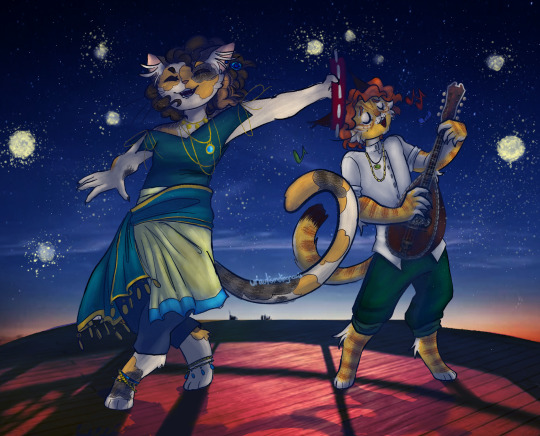
✨she couldn't sing for nothing and he couldn't dance for nothing can I make it any more obvious✨
Kwaziis parents (in my au, Misty Memories), Anira and Kenneth. They're in their party clothes lol Yes they have full character arcs and lore and no im not going to share their whole lives right now.
HOWEVER,I shall BRIEFLY describe them and how they met under the tag!!! <3 u don't have to read but yeh :> 😊
If yall have any questions about them or their personalities tho let me know in comments or ask box :>
Their story takes place from late 80s to early 90s btw,
Kenneth is clearly the second son of the Calicoed Jack and younger brother of Kingsley by about 2 or 3 years. Kenneth (also nicknamed "Kenny boy"or "Kenny kit" as a child) is... Well to be honest hes not very good at being a pirate, especially not like his parents. An anxious and overly cautious one.
He couldn't properly swing a sword without closing his eyes for fear of injuring himself, he was clumsy (even by non feline standards-), and was afraid of spiders. (And heights... and loud noises... and that one Pelican that tried to eat him when he was a kitten- and also-)
However, he was still raised a pirate and had the soul of one, shanty songs and tales spread through the ocean about its depths and tragic battles- He was also very good at cooking-
As a result of his mothers... tragically lost battle with illness, (and witness of his fathers struggles with infection after losing his eye and leg)hes also extremely paranoid about disease and injury...
(his father loved him dearly but hadn't realized that kenneth had low self esteem for... not living up to him, his mother, and his brother... CJ was a young and inexperienced father and also tried his best to teach kenneth- you know like fun survival challenges between him and his brother and how to fight- he uh.. he was good at surviving on an island at least? It was very safe of course, they weren't actually stranded, but it was "just in case" and also "the pirate way" and whatnot.
CJ (calico jack) did tease him a bit about "still feeling like a wee kit" in regards to his pirate failures, it wasn't ever in mean spirit, more fondness over his sons excitement in sharing the shanties he wrote himself! (Shanties cj would later use to stay sane in the amazon...) but kenneth still felt hurt by those comments though he never showed it... laughing along🥺 <:< )
anyways since kenneth didn't want to be a self proclaimed dead weight and was so concerned about injury and disease (bot as easy to get hospital treatment as a pirate yk?) Kingsley advised him to get real schooling- schooling that would give him credibility for a fake identity so he could become their crews official medic someday. Something incredibly valueable and needed.
Thats how he ended up spending half the year at a "flexibility school" in Japan meant to accommodate children who couldn't stay at school for the full year. Whether it was due to international travel, long term illness, apprenticeships (the salty spirit was usually undercover as a "transportation vessel" for the "Sarah Sails" company which was just a fake company made by their clan the Split Tail), and ofc children hopping between foster families- because of the flexible needs yk?
Like Anira.
Anira Kucing (name inspired by the kucing Malaysia cat breed) is, who would've guessed it, originally from Malaysia. Anira doesn't know this but her mother had fled from her home country due to the unfortunate circumstance of being a prime suspect for the death of her sister. Unfortunately, while her mother did manage to take a new identity in a new country, she became very ill from cancer when anira was very young and died <:( thus she was legally an orphan, and ended up attending the same school
Anira is ah, ahem, a... unique individual- grew up assuming her father had abandoned her and her mother- only to lose her mom while young and still be seen as a foreign stranger of Japan despite being raised there her whole life. She also had an interesting tendency to pickpocket everyone in sight :) because if she didn't have anyone to dote on her she might as well dote on herself! Yk with like.. stolen cash that the rude rich kids that whispered about her didn't even need anyways >:)
Anira thus became Very Talented at getting people to talk about themselves, and while that was a great way to distract people from their wallets,it was also a GREAT WAY to get fresh juicy gossip ✨ then she hears about this FOREIGN ENGLISH SPEAKING CAT GUY???
Needless to say lil wee kenneth was uh.. a very new lil guy and ofc she just hadddd to help him cuz she's so kind and great! Esp since he looked so lost and like a total dumdum. well what happened was she ran up to him after school, dragged him away to a random street as she rambled in broken English, and then said "watch this!!"
And proceeded to pickpocket three very mean looking older teens. Kenneth, who, understandably, was very freaked out by this tried to drag HER away from them- and then well... hes got broken japanese and well things escalated 😔
He got into a fight with the three older teens, or rather a "run way swat at with claws and TRY TO RUN AWAY SOME MORE because oh great im corned in an alley :) , he also tried to find anira so they could both run away but uh... she was gone...
He tried to escape by scrambling over the wall of the alley only when a small paw reached out to help- and thus they escaped together-
Later on when they caught their breaths on a rooftop, he tried his best to ask her *HEY WHAT THE HELL* as politely as he could. This tiny little menace grinned as wide as possible and showed him FIVE WHOLE WALLETS full of coins she stole! She thanked him and told him SHE was going to treat HIM to some icecream 🥰🥰🥰 and anyways kenneth immediatly fell in love. And you just know she ate up his cringey (cute) middleschool love poems too
Of course when he went to "do his sailing apprenticeship" well- of course our girlie mightve sorta followed him and stowed away and well mightve forcefully wormed her way into his entire family 🥰🥰🥰 honestly tho she had like two crack headcanons that kenneth was actually an alien spy since he was so bad at being a cat or a secret pirate because he just agreed with crime very casually and didn't realize how strict laws actually were. She DIDNT THINM HE WAS ACTUALLY PART OF A PIRATE CREW THOUGH-
Anira very much fell in love with the freedom of being a pirate, the culture and the family, and also the beliefs of the polynesian cultures they visited and adopted many of the beliefs as an honorary sister of sorts ig? Yeh :>
If you're wondering yes she did join their crew and became a navigator of the salty spirit! Very good at it too lol, and CJ loved her and doted on her like his own daughter,often sneaking her candies- Kingsley and she became ah, how shall we say- the siblings who have heinous prank wars either with eachother or on literally everyone else and can't be left alone together under any circumstances.
anira always loved kenneth for who he was entirely and kenneths entire bloodline is just a wee man who falls for a woman who commits crimes and he's no different. I'll have to post about calico jackand his wife maddie sometime
Anyways thats it lol, more details about them and their relationship and story will be shared later on hope you enjoyed lol
Enjoy this icecream as a reward for reading all of that ✨🍨✨
#my art#octonauts#octonauts art#Octonauts ocs#Octonauts kwazii#Kwaziis parents#Misty memories#Misty memories anira#Misty memories kenneth#Misty memories Kingsley#Yap post#octo lore#Lore post#Octonauts lore#octonauts fanart
59 notes
·
View notes
Text
Writing Notes: Three Act Structure
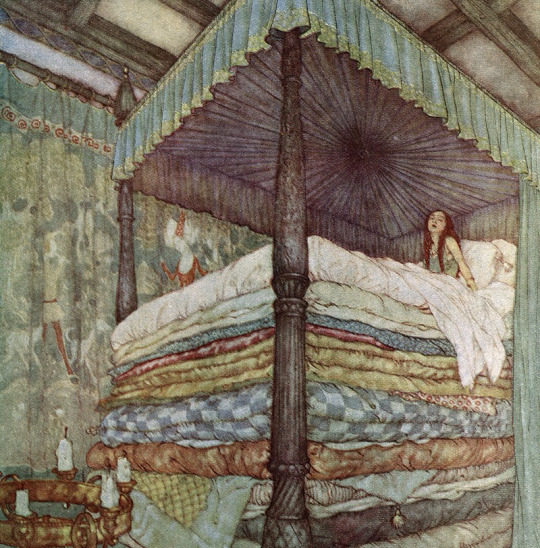
Three act structure - divides a story into three distinct sections, each anchored around one or more plot points that drive the overall action.
Over the course of the three acts, a complete story structure unfolds.
The main character passes through the stations of a character arc, the main plot builds toward the realization of the protagonist’s goal, and by the end, the action is resolved and key loose ends are tied up.
History
Novelists, playwrights, and screenwriters have many options for organizing the structure of their novels, plays, movies, and television episodes.
Traditionally, these narratives are broken into acts, which are subdivisions of the overall story.
Some stories are told in a single act, like short stories and one-act plays.
Sometimes a storyline demands many acts. Example:
Willam Shakespeare was loyal to the five-act structure when writing his plays.
Yet of all the ways to subdivide a story, writers have shown great loyalty to the three act structure, which is typical of most forms of modern storytelling.
The notion of three-act storytelling traces back to Aristotle, who theorized on story beats in Poetics.
He argued that stories are a chain of cause-and-effect actions, with each action inspiring subsequent actions until a story reaches its end.
Elements of the Three Act Structure
At their most basic, the 3 acts of a book or script represent a beginning, a middle, and an end.
In most three-act stories, about 50 percent of the actual storytelling occurs in the second act, with 25 percent of the story falling in the first act and 25 percent falling in the final act.
ACT ONE
The first act typically starts with exposition—one or more scenes that establish the world of the story.
If the story contains supernatural elements, the rules of the supernatural world would be established here.
This act should also establish the ordinary world of the story’s main character.
Before the act is over, however, an inciting incident should occur—one that pulls the protagonist out of their normal world and into the main action of the story.
Concludes with some sort of turning point that launches the action into act two.
ACT TWO
A story’s middle act consists of a rising action that leads to a midpoint, then devolves into a crisis. Example:
A story is about a detective who is tracking the killer of her murdered partner.
The Act One inciting incident would be her partner’s murder, and the turning point would be her decision to track the killer.
Thus the rising action of Act Two would involve the sleuthing she must do to track down the murderer.
Act two will raise the stakes of the protagonist’s journey, perhaps revealing the danger to which she’s exposing herself. By the story’s midpoint, the detective would be fully immersed in her journey.
Typically ends with another turning point that makes it seem as if the protagonist will fail. This is sometimes called the “dark night of the soul.”
Perhaps our detective has gotten too close to the killer and has been wounded by one of his henchmen, allowing him to escape.
ACT THREE
The third act begins with what’s known as a pre-climax.
This consists of events leading up to a climactic confrontation in which the hero faces a point of no return: they must either prevail or perish.
In our detective story, perhaps our hero has regained the trail of the killer and has traced him to a safehouse.
This launches us into the actual climax, where the detective apprehends her partner’s killer—either taking him into custody or killing him.
Finally the story de-escalates in a denouement, where the events of the climax wind back down into normal life.
Of course the hero detective’s life will never be the same again.
Note that almost all novels, movies, and TV episodes have subplots (also known as B-stories) that occur concurrently with the main plot. These subplots, often crucial to character development, may also follow a standard three act structure, but the way they play out varies greatly from story to story.
How to Use the Three Act Structure
The best way to incorporate three act structure into your own writing is to map out the key plot elements that should populate each act.
Act one: exposition, inciting action, turning point into act two
Act two: rising action, midpoint, turning point into act three
Act three: pre-climax, climax, denouement
Some novelists and screenwriters consider these story points when they brainstorm; others brainstorm in a far more open-ended way and only later do they consider specific plot points.
If you’re the type of writer who prefers open-ended brainstorming, perhaps via the snowflake method, don’t disrupt your process by thinking about act breaks and a specific plot structure.
If you prefer to be hyper-organized in your writing process, it may make sense to keep the three act story structure in mind from the very beginning.
It can be a useful planning tool to think of the story in terms of exposition, inciting action, rising action, and beyond.
Just remember when you are writing a novel or a screenplay that good stories don’t start with templates for act breaks; they start with memorable characters, vivid worldbuilding, and a protagonist whose journey is worth following.
Once you have those in place, a three act structure will likely naturally reveal itself.
Source ⚜ More: Writing Notes & References
#on writing#plot#writing tips#writing advice#writeblr#spilled ink#dark academia#creative writing#writing inspiration#literature#writers on tumblr#poets on tumblr#writing prompt#writing reference#poetry#light academia#fiction#edmund dulac#writing resources
109 notes
·
View notes
Text
In light of the info about the properties of souls in The Unwanted Guest, I want to shout out that Gideon — with no grounding in the theoretical underpinnings of the subject whatsoever — actually makes basically the same observation about the permeability of the soul at the end of Harrow the Ninth, when she's in Harrow's body and (with some justification) is pretty sure she's about to die in the River:
Harrowhark, did you know that if you die by drowning, apparently your whole life flashes in front of your eyes? I didn't know, as I died and took you along with me—having kept you alive for what, a whole two hours?—whether it was going to show me both. Like, at the end of everything, if it was going to be you and me, layered over each other as we always were. A final blurring of the edges between us, like water spilt over ink outlines. Melted steel. Mingled blood. Harrowhark-and-Gideon, Gideon-and-Harrowhark at last.
‘As we always were’! ‘Melted steel, mingled blood’! (Also interesting that despite saying earlier in the book that all she ever wanted was for Harrow to eat her (oh Gideon), the metaphors Gideon reaches for here are not about consumption ala what Ianthe’s deal and thus traditional lyctorhood is presented as in TUG, it’s about similar and equal substances joining together to a new whole, more like what we see with Paul. I personally feel like a Paul-style merging for Harrow and Gideon is not in the cards and would not be a satisfying ending — it worked as a bittersweet conclusion specifically for Pal and Cam because those two are utterly nuts in all their sanity lol, but I don’t think the series means to present it as The definitive answer to the central question of individuation vs. connection. There is something so moving to me, though, in the fact that right at the end this is what Gideon wants for her and Harrow. Not for Harrow to eat her, not simply to be of use to her, but to be made together from the same stuff. It’s a longing for connection and union that’s finally at least in imagery free from the imbalance within the ultimately hierarchical roles of necromancer and cavalier that Gideon internalizes through her corruption arc in Gideon the Ninth, understandably so as it’s the only model she’s presented with in their society to understand intimacy and attachment and devotion through. But Gideon says Harrowhark-and-Gideon, Gideon-and-Harrowhark at last, mutually and equally. And I’ve written about this before, but at what must be almost exactly the same time, the same process is happening in Harrow’s mind through the evolution in the symbolism of her dream bubbles. Help I am emotions now)
Palamedes is so right, Gideon is a lot smarter than most people -- including Gideon herself -- ever give her credit for.
#the locked tomb#griddlehark#the unwanted guest#the unwanted guest spoilers#the locked tomb spoilers#tlt spoilers#tug spoilers#gideon nav#harrowhark nonagesimus#harrow the ninth#the locked tomb meta#hope I got all the spoiler tags shout at me if I missed something lol#(tbh I didn’t even realize at first that the soul thing was supposed to be a new revelation in the short story#rather than a confirmation of what we already knew#because Gideon had all but spelled it out one whole book ago fhdskjafsh#insert ‘why am I gasping I already knew that’ barbie meme but like in the opposite direction here)#tlt meta
760 notes
·
View notes
Note
Hi, I'm working on a theory for Ramshackle and MC. Have the creators said why Queen of Hearts/Scar/etc. were chosen for the Great Seven? ((Also, why did MC become the prefect of Ramshackle and not the Housewarden?))
Hello hello!! Thank you for this question, it became a rabbit hole!
Yana had this to say about the villains who were used for inspiration (from the game guide):
"The number one reason is that they are all from 'masterpieces with which everyone is familiar'. They are all legendary—you need only say the movie titles and the characters come immediately to mind.
Since they are also legends in their own right, we thought it would be good to choose stories with a long history, and that is how we settled on these seven.
There are many other movies with fascinating villains, so it was a very difficult decision."
-Twst Game Guide (2020)

She also goes into detail about the different eras during which the movies were set, which may also have influenced which were selected! More here! (Youtube)
But there may be more going on than we have been told 👀 There are theories that "death" is another theme that links the dorms together!
All members of the Great Seven were villains that either died in their movies (Scar, Ursula, Maleficent, Jafar (in the second movie), the Evil Queen), or were never alive in the human sense to begin with (Queen of Hearts, Hades).
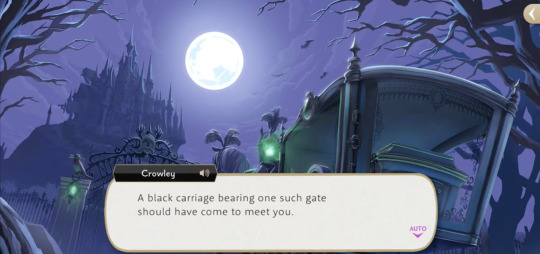
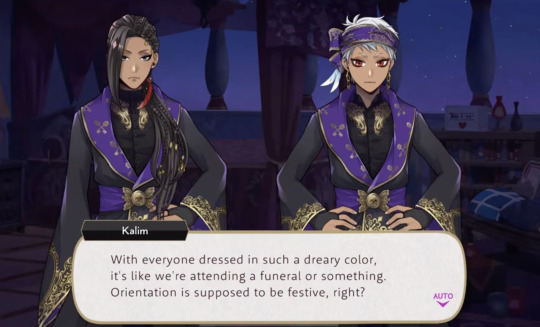
Death has never been a subtle theme in Twst, with new students at NRC arriving via coffins.
Kalim observes that, with the ceremonial robes they wear to orientation, "it's like we're attending a funeral."
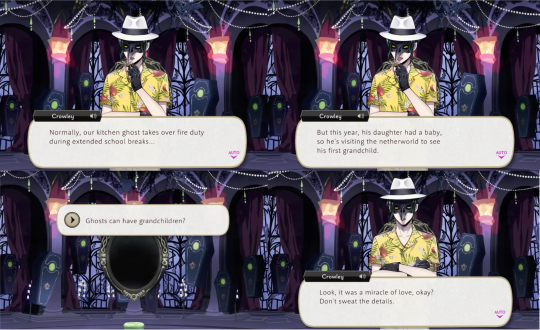
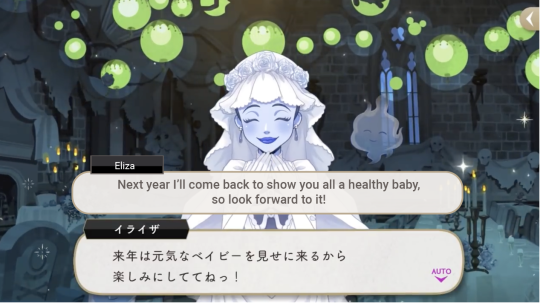
And there are also the ghosts!
While it seems possible to be born as a ghost (according to Crowley and Eliza), Lilia says that ghosts "linger here due to powerful attachments or personal motives...they aren't visible outside of magically suffused locations like Night Raven College," and that they "linger" by choice.
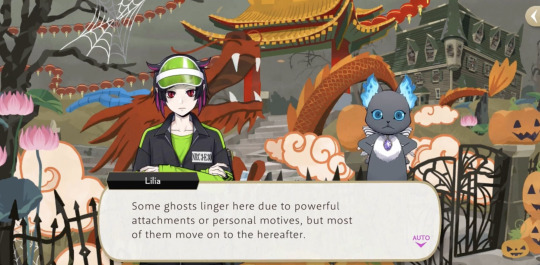
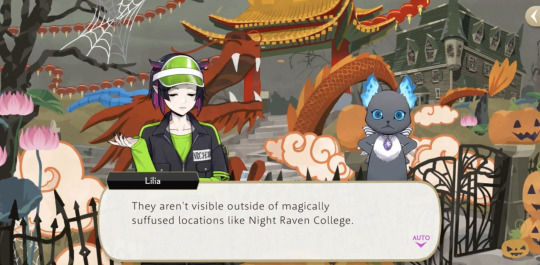
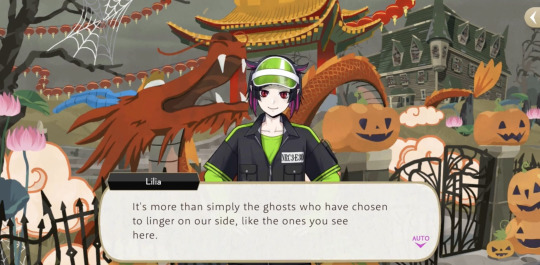
And this brings back to the prefect!
In the manga, all three prefects that we have seen thus far have had names connected to the afterlife:
・Heartslabyul Arc, Enma Yuuken (円満 雄剣): Enma's family name is pronounced the same (the kanji is different) as 閻魔 (Enma), the king of hell in Buddhism. From the Kyoto National Museum website: "The King of Buddhist Hell is Enma, who is also the judge of the afterlife."
・Savanaclaw Arc, Hirasaka Yuuka (比良坂 悠河): "Hirasaka" is written and pronounced the same as the hirasaka of Yomotsu-hira Saka, known as "The Entrance to the Underworld" in Shintoism, explained on Shimane Prefecture's official tourism website: "Yomotsu-hira Saka appears as the boundary between the land of the dead and the land of the living."
・Octavinelle Arc, Mito Yuuta (三途 宥太): "Mito" uses the same kanji as 三途川, the "River of Three Crossings," which is "a mythological river the souls of the deceased must cross by one of three crossing points." Credit to blogger Tansho for the discovery that "River Styx" was changed to 三途川 in the Japanese-language dub of the "Hercules" TV show.
So there is definitely a theme of the prefect filling a role between life and death!
While one theory is that the prefect ended up in Twisted Wonderland after they died (in the manga it is insinuated that all three prefects were hit by vehicles directly before waking up at NRC), another theory is that they're not quite dead yet.

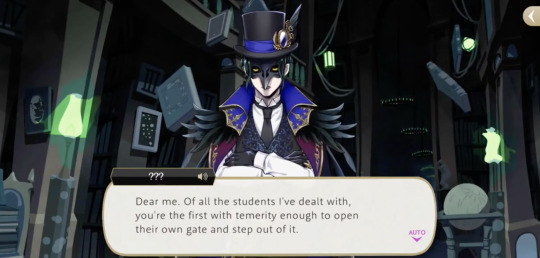
If that is the case then they may be close (Grim wakes them up prematurely, and Crowley says that this is his first time having a student who opened their "gate" (coffin) on their own) and they might just be an astral projection of someone who is between life and death, appearing at the magically suffused location that is NRC.
In other words, a ghost 👀
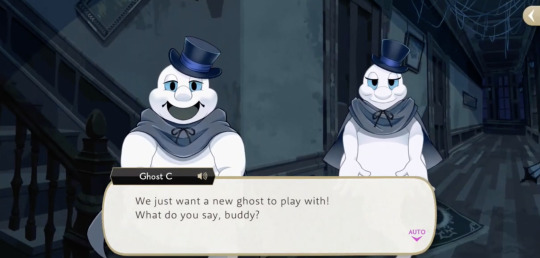
The manga is following a theme of naming its characters something involving "Yuu" (which is always the students' nickname for them) and "Yuu" is also commonly adopted as the default-name for the game's prefect.
Another word that involves a "Yuu" sound is 幽霊 (Yuurei), which means: ghost :>
(Hence the name of this blog! It is the very chuunibyou name of a twitter account I made in 2018 to complain about my job. This potential connection to Twst was completely unintentional and makes me laugh.)
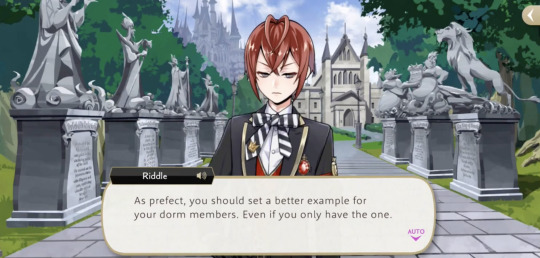
As for why the prefect was named Prefect of Ramshackle dorm instead of Housewarden: I am not sure! But it seems to have something to do with the unique situation that is the prefect's role.
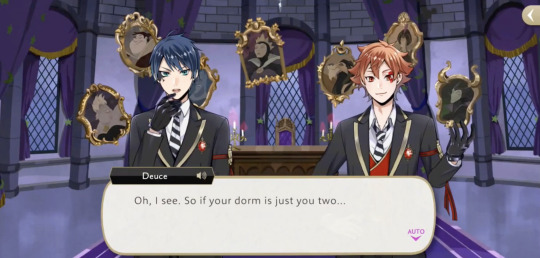

They have not technically been assigned to the overseeing of the dorm as a whole, just to Grim, so maybe that is why? :>
And it is particularly interesting as that means that the role of Housewarden of Ramshackle Dorm is still open--maybe to be filled some day...? 👀
307 notes
·
View notes
Note
Thoughts on a prince of life?
Sure! Class = character arc and Aspect = base personality traits.
The most common misconception around Princes is that they lack their Aspect - the opposite is actually true! Princes suffer from a toxic overabundance of their Aspect, and boy do they make that everyone's problem.
It's really fun to describe Eridan as hopeless and Dirk as heartless, but if you actually drill down into their characters, you'll find that Eridan's major issue is having too much Hope, while Dirk's is having too much Heart.
Eridan is a hard-headed idiot who simply does not listen to other people, defining his own reality irrespective of the input of others. Cronus shares these traits to a lesser degree, and Jake, a Page (so, starting in deficit of their Aspect) is the opposite in a way that reinforces that Eridan is running at 200% Hope while Jake is at -100%. Jake is famously wishy-washy; Eridan takes hardline stances at the slightest provocation and you can't convince him otherwise. Jake has no standards when it comes to movies; Eridan is a hipster who castigates Kanaya for being into Twilight.
What is Dirk? He's solipsistic. Heart governs the self, soul, and identity, and Dirk has way too much of that. He's highly occupied with himself, the persona he projects, his own feelings and desires. I personally believe that Hal is a wholly separate, unique entity from Dirk, but he's a Mind player (Mind players suffering from lack of personal identity, which ties into how even Hal considers himself to be a splinter of Dirk), so he offers a good look at what equal and opposite character traits might be: where Hal is genuinely manipulative, constantly playing mind games with their friend group, Dirk's version of "manipulation" is actually incredibly straightforward - he just outright tells Jane that she'll be a puppet leader and he'll be pulling the strings. Hal criticizes Dirk for being a needy, emotional wreck when he starts dating Jake, and the glimpse we see of it is a very Heart-esque "don't worry about me or my feelings, what do YOU want to do? 🥺🥺🥺". And, of course, his self-loathing - he can't help but see all his own flaws, a Heart ability echoed by Nepeta's uncanny intuition regarding peoples' true selves, intentions, and desires - and he can't help feeling burdened by himself, his splinters, his identity.
Thus are Princes burdened with too much of their Aspect, put to poor use. Moreover, they bear a great sense of duty or responsibility, some driving anxiety guiding their actions. Dirk is the most anxious of his party over their lack of progress in the game (and inability to MAKE progress), while Eridan's obsession with genocide ultimately stems from his duty to prevent genocide on a daily basis by feeding Feferi's lusus. The "good of the species" has always been on the very forefront of Eridan's mind, and he's a wreck about all the sacrifices he's had to make to that end.
Because they have such strong, overwhelming personalities, and are motivated by an anxious sense of duty and responsibility, they're very difficult to dissuade from their path of self-destruction. The class is very masculine in this way - it's hard-headed and arrogant, its players having a penchant for declaring that it's "my way or the highway," that they know best. Eridan and Dirk are both associated with toxic masculinity, with Hussie explicitly saying that the worst parts of Dirk - his intellectual aggression and penchant for mansplaining - are the parts that made it into LE, while he also explicitly calls Eridan a proto-Caliborn and makes mention of his poor behavior around women specifically.
Thus Princes are on a marching path to self-destruction, since ultimately, any pursuit fuelled by their egos and anxiety isn't sustainable. This is where they "destroy their Aspect" - they destroy themselves; without intervention, Princes will eventually run themselves so ragged that they - and whoever is unlucky enough to be in the same room - come crashing down, removing themselves, and their Aspect, from play. It's one of the greatest disasters that can befall a team, something very difficult to recover from - Eridan kicked off murderstuck, and removed Hope from play (the Page of Hope even has his dreamself killed - Hope is dead, indeed); Dirk's trickster diatribe shattered the group friendship dynamics, and they were never fully able to recover, especially Jake. It's also implied that the great disaster that Mituna tried to prevent was Kurloz's Prince meltdown, something he ultimately failed to do; Kurloz taking charge of the team's blackroms means that the dancestors simply don't have any, and contributed to their stagnation - he removed Rage from play.
This makes Princes sound very volatile and dangerous, and they are, but no moreso than any other Class at its worst. At their best, however, Princes are the ultimate obstacle removers, whatever those obstacles might be. Their toxic overabundance means that, while they lack the delicate touch other Classes may have, they can harness it into a razing, overwhelming force, the true form of "destroying with their Aspect". Eridan at one point had a prophecy to destroy LE, and with Hope's gamebreaking ability to make the impossible possible, it's very well within his capabilities to have bypassed LE's unconditional immortality, had he been able to self-actualize. If Brain Ghost Dirk had had more time, it's possible he could've killed Aranea, even though she was wearing the Ring of Life.
Their senses of duty and responsibility make them very reliable, powerful allies if they can be knocked out of the Prince Downward Spiral. They're the first to rise, last to bed, and tireless in pursuit of the greater good and Ultimate Reward. And they just also kick a ton of ass. It's good to have an asskicker in your corner when you need one.
Speaking of Life...
Life players are stubborn optimists, though this doesn't mean they're good-natured. Feferi is outright defined by her stubborn optimism, no matter how dire her circumstances, even as this leads to some not-so-savory results - like her insistence that the Horrorterrors are friendly and nice, completely ignoring how traumatized Eridan was by Gl'bgolyb, or her desire to remake Alternia with casteism fully intact. Meenah literally refuses to listen when people try to tell her that the immortal, invincible demon is immortal and invincible, and only Cronus can dissuade her from thinking the Condy is the coolest, sexiest, awesomest thing ever. Jane is a skeptic who refuses to believe that her friends are from the future, or even that Crockercorp is evil, insisting that they're just messing with her and that, as heiress, she'll be fixing it up someday.
So we see the other character traits they tend to share, especially at their worst - while Life players do often have a focus on helping others, on forward progress and betterment of themselves and society, the catch is that they tend to be doing so in a selfish way - Meenah's bullying was motivated by her desire to galvanize her party into action and self-actualization, but was also just cruel and done for her personal pleasure and love of violence (let's also note that her main target was the lowest caste immigrant girl). Feferi wants to stop state-sanctioned murder, but only because she loves taking care of things like they're pets and she finds them adorabubble (casteism is still Very Much A Thing on Beforus). Jane wants to make Crockercorp better for people, but she still very much wants Crockercorp - and consumer capitalism as a whole - to keep existing.
Which is the last Life trait I want to touch on - its players tend to be very stable and "normal" (that's the word Hussie uses for them), but in doing so, they tend to naturally prop up the status quo, even if that status quo is harmful for others. That's the dark side of Life players - they're very normal, but normalcy can be, in itself, harmful. They love forward progress, but tend not to notice the people that progress tramples. They like to take care of others, but on their own terms.
So a Prince of Life takes form. This is someone who is, more than most Life players, duty-bound to protect the weak and heal the wounded - whether or not the weak and wounded WANT that. Life players already have a tendency towards self-satisfied, overbearing personalities, and the Prince class would likely exacerbate that, even as Life's stability mitigates the Prince's anxiety somewhat.
Their meltdown, then, would likely not come from a well of anxiety, like other Aspects, but instead from a feeling of being spurned. Princes have a tendency to push others away with their difficult personalities, and a Prince of Life would likely not take very well to others pulling away from them, since they're likely to be heavily convinced of their own righteousness. Life players have a tendency to push forward even if it means trampling over others, and a Prince of Life at their lowest would feel the need to take matters into their own hands. Class is subject to Aspect - Eridan's destruction ultimately took the form of making something fake real (magic) - so a Prince of Life would have a self-destructive meltdown in a way befitting of a Life player - perhaps they unleash a zombie apocalypse, a plague of locusts, or summon so many vines and plants that they drain the life out of the rest of the earth - and even the rest of the team.
So our Life player is probably strongly obsessed with forward progress and making everyone into (what they deem to be) the best versions of themselves. Life has associations with genetics and biology (the Condy's experiments to give herself other psionic abilities is likely an expression of being a Thief of Life), so our Prince of Life probably has a penchant for some Frankenstein-style mad science, and/or a pursuit of "genetic perfection." You can quickly see how a Prince of Life becomes a dictator-esque character, even verging into the territory of eugenics, and how easily they'd be able to convince themselves not to listen to the complaints of their team, as they simply "know better" than everyone else, and believes themselves to be acting "for their teammates' own good".
Princes are burdened by their Aspect in excess - Life, with its associations with normalcy and status quo, means our Prince of Life feels some great pressure to conform. A high school Mean Girl, an influencer, or an HR-type position would suit them. This is someone who is overbearing about pressuring others to conform, but ties a lot of their own self-worth to how well THEY conform. Given Life's associations with genetics and biology, it's likely for them to be obsessed with all the latest fad diets and cosmetic surgeries. It's a pretty fundamental part of Prince psychology that, while they often feel satisfaction from moving their goals forward, it's difficult for them to truly feel relaxed, happy, or content. Thus, while the Prince of Life would project an air of easy confidence and self-satisfaction, and being a Life player does take the edge off the Prince Anxiety, the Prince of Life is still a fundamentally unstable and unhappy person at baseline.
In doing so, the Prince of Life would remove Life from play - all progress would stop dead in its tracks, and helpful resources would crumble to dust. Prince meltdowns are often a party's turning point, and very difficult to undo without fully changing the past, and a Prince of Life is no exception.
But a Prince of Life whose party is able to get through to them, who's able to have their beliefs challenged and comes to realize that the right way forward is one walked with everyone's input, not just their own personal view of the greater good, is an incredibly powerful ally. Again, Class is always subject to Aspect, and every Aspect still has things it can do even if the Class is not well-suited for it - Doom players always have prophetic visions (Mituna can see the future even though he's an Heir), and Life players always have a healing touch (the Condy, a Thief, could still extend the Helmsman's life). While being a Prince would make them less well-suited to heal than perhaps the party Sylph or Maid would be, their abilities are still intrinsically based in Life - perhaps they're clumsy to heal minor wounds, at least not without inflicting weird mutations, but they'd still have the capability. I imagine a Prince of Life would be able to grant very powerful buffs to their teammates, pushing them to their physical limits, even if there's a crash afterwards. They'd also be, in general, an utter menace on the battlefield; I see vines erupting at their command, crushing buildings in an instant. I'm also imagining medic from tf2 lmao.
I love princes hahaha
45 notes
·
View notes
Text
Y'know w the end of lin ling's pov soon and the start of e-soul's arc after that, I kinda have been thinking more about what "zero" is
and zero for sure is this guy from e-soul's pv:

(who is probably also the guy in the opening that shows up really briefly btwn two shots of X that everyone notices at some point and goes what the fuck is that thing:)

(i'm also pretty sure these are the same guy but what's up with the ears?? horns??)
and he was at least a former hero who turned evil and had to be taken down by E-Soul (which is REALLY simplifying whatever the hell happened in the E-Soul PV, there is so much going on BUT this part is at least true)

and we don't really get many other mentions of zero outside of here but there is one mention in the heroes exist to protect trailer (@ ~0:57, said by Dragon Boy) that indicates that zero is something you could Become.


Personally, I'm still conflicted if "becoming Zero" is more like how Lin Ling became Nice (public perception literally turns you into Zero) or more like becoming X (Zero is a title that you can obtain), but it's still interesting that it's something you could become instead of just being that one guy.
(And then of course, that begs the question of if Zero is a title or role you can become like X, then what exactly does it do/represent in this hero system? The Zero back then is definitely a hero, but considering what he did, I couldn't really see the identity of Zero still being considered heroic. So it's probably more of a villainous role in the present? Dragon Boy does seem like an anti-hero to me at times, so I wonder if he wants the strength of being Zero but with good motivations? Disclaimer that I don't really think much about Dragon Boy, so these are just kinda ramblings. Well, okay, all of this is ramblings lmao but this is MORE rambly in comparison.)
(There's also currently no direct connection between Zero and X other than the opening, but it's kinda interesting to think about how the ideas of Zero and X could contrast each other. Like taking a step back from the in-universe dynamics for a minute, if X is meant to be "anything" then could Zero be "nothing"? What does it mean to be "nothing" in this whole system? Does it just means nobody trusts you??? God yeah you would be crazy powerful with fear if Nobody trusted you at all huh.
Though if you asked me outside of tbhx the symbolism of the number zero, I always feel that in general, zero in a way is a number that can go anywhere and thus in a way could also become "anything". But zero must change to do so. X can change but X is still X, but if zero were to change, it doesn't stay as zero. I don't think that's where the show is going because zero as "nothing" seems more common. But I am in fact a little annoying about zero symbolism in general so. I'm putting this here.)
anyways uh 👍can't wait to meet zero (the E-Soul guy)
#mine#to be hero x#this post was SO MUCH LONGER.#because i had a whole other part before i realized i couldn't use it bc i couldn't tell if what i was seeing in a ss was a zero or not#but basically i thought that lady in ep 1 who shows up after x's image fades away was a Zero (assuming zero is a title)#which would've opened up a whole new world of rambling#but then i went to go grab screenshots and realized hm. Uh. Is That A Zero.#so i ultimately chose to just leave her out#tbhx number stylization is after me. again.#anyways i spent way too long writing this up. be free my scarab
31 notes
·
View notes
Text
Episode I dunno, like 60? Is anyone keeping track? OMG it's 52. This is part 52.
Remember how I was like "I'll be able to get the next episode up real soon!" Well...
...you can probably guess what happened...
But we're back again! Last post I mentioned that this season it felt like Yami spent his time finding his lost memories of his father and his friends, but I feel like Yami never found himself in all of this.
But, he did make a new boobie card!
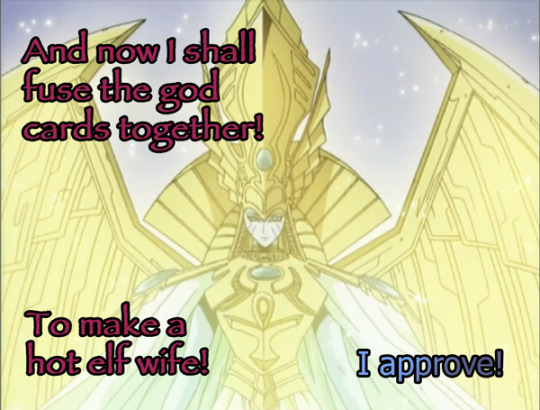
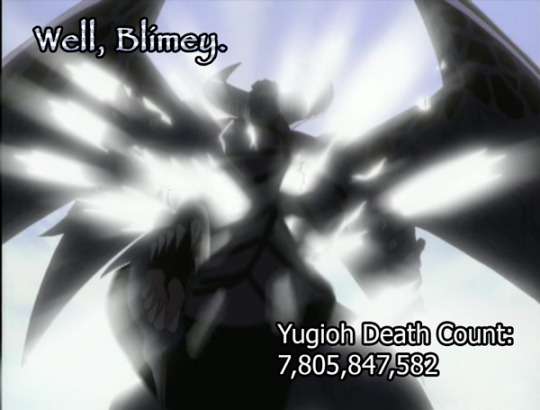
And there he goes, goodbye Zorc, I hardly knew you. Like literally. This was a very short arc (despite how long it took me to write these recaps)
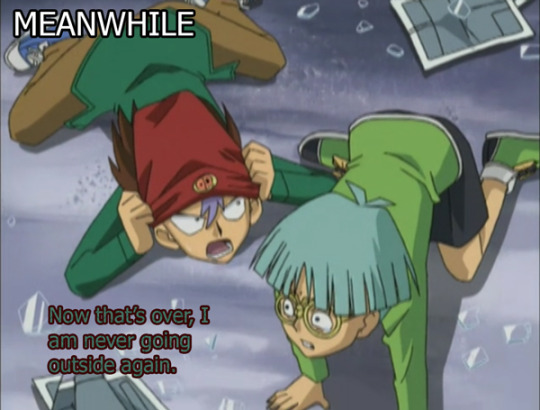
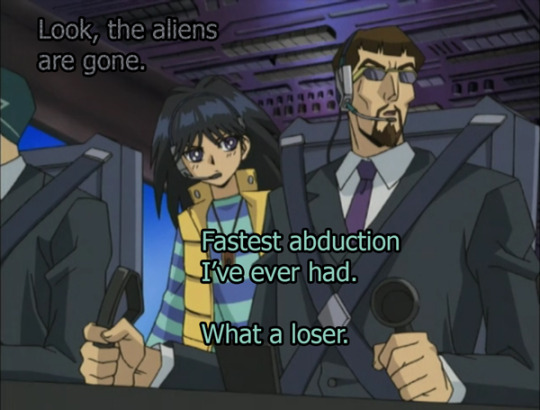
The sun comes out to welcome another scorching day in the desert, and all of our starry eyed friends wonder at this new guy, Atem.
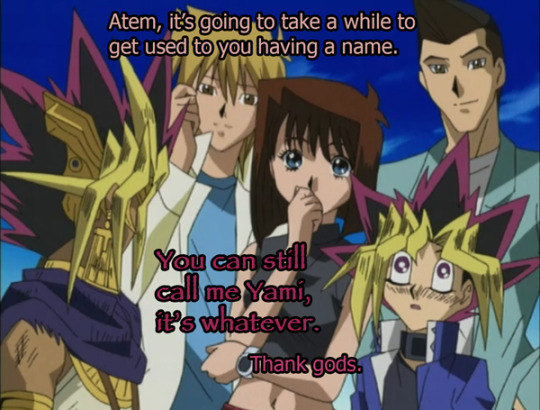
JK, he’s still Yami, thus confirming my whole spiel from earlier about if this new name is even important past that one single plot point with the necklace. It's really not.
It’s the end of the show, the bad guy is dead…maybe it’s just me expecting the show to follow the same formula as any other adventure show when the love interests are reunited but hot damn
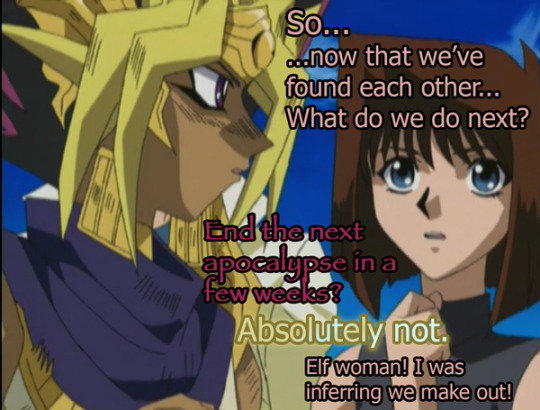
Tea is the one who gave him the airport cartouche to save his ass, she's supposed to have been ... dating? ... him the past 5 seasons. Does Tea EVER get sidelined in this show, hahaha!
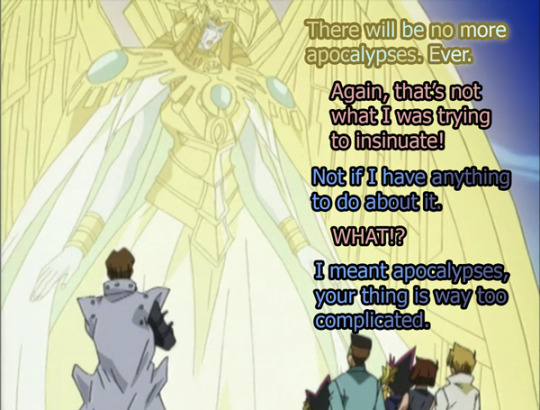
Please admire the shape on this jacket on Seto. Caught this in a beautiful animation tween.
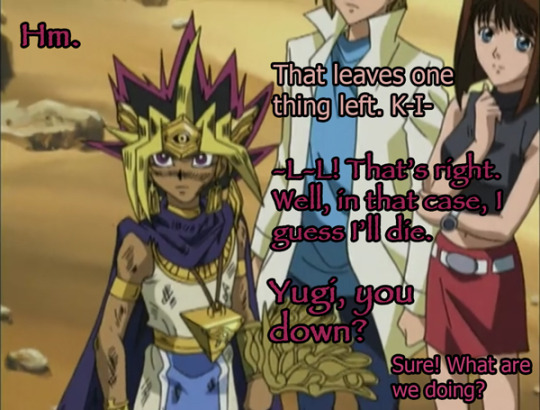
Ah, and now the second dead as hell elephant in the room 🐘🐘, it is time to put Yami away.
Forever.
That’s right. We’re going to cure Yugi in the show that is all symbolically about living with an uncurable mental illness. We’re going to stuff this brand new friend directly back in his tomb in a show that is all about making new friends. We’re going to treat Yami like the crutch I have said he was for the last 5 seasons, but only in the last half of the last arc of the show.
Yugi is going to grow up, be a man, and uh…kill his best friend to do it, I guess. Neat.
And I’m sure the show was like “no, this isn’t death” but what is death in my counter? That’s right, soul disconnected from body, that is death. Welcome to the death pile, Yami, you’ve been here before and now you get to be here again!
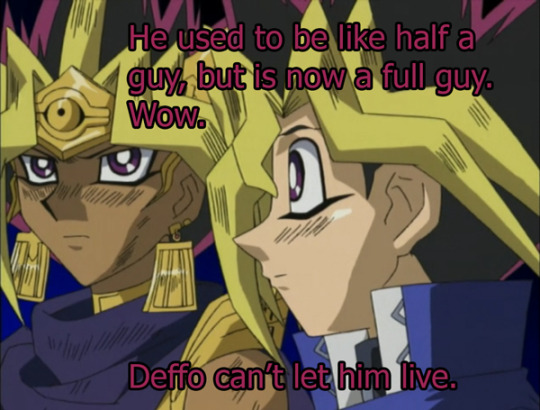
And like don’t get me wrong, I’ve been wanting this guy out of this boy’s bean since day one, it’s a very unhealthy thing they got going, but the whiplash of how quickly we all decide “Yep, lets do it,” is very, very funny.
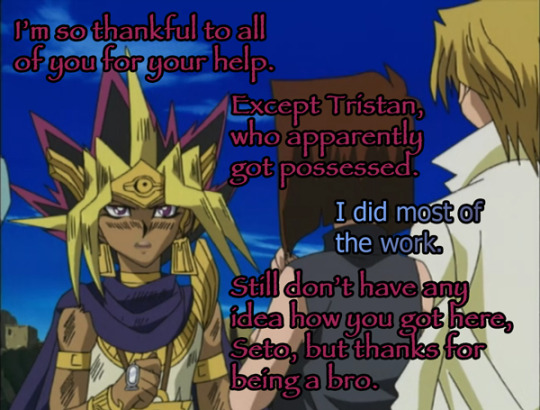
We also address the third elephant 🐘🐘🐘, which is how the hell Seto got to fake Egypt and what the hell is he still doing here?
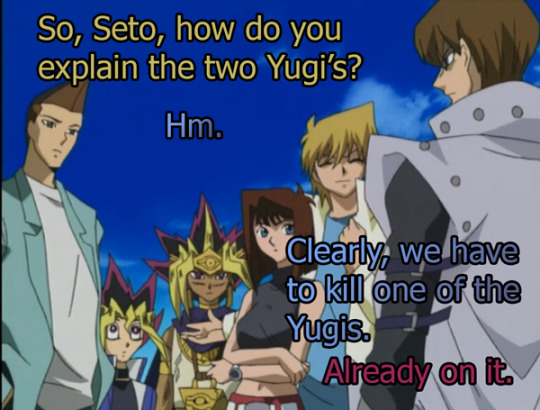
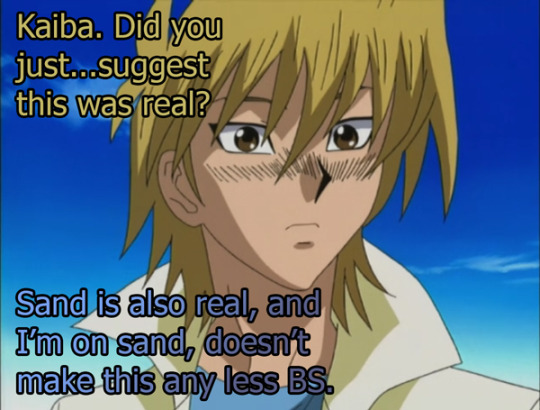
And thus we end the Kaiba arc of this season. He started a man who did not believe in magic, and ended a man that might believe in magic sometimes. Cool. Most of the Seto development was by the Seto in the hat, not gonna lie. Seto was mostly here for eye candy, and that’s OK. That’s Joey’s job most of the time, after all, so it was time Seto did some of the heavy lifting.
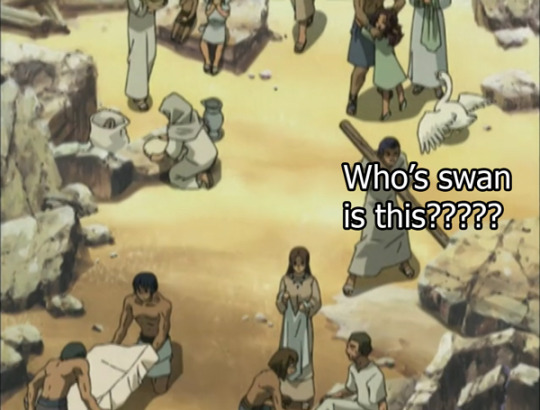
Egypt picks up the rubble, as I’m sure they have to do quite a lot in this era, when Yami decides to hint to Hat Seto that Seto’s whole coup was a huge waste of time because Yami was going to give him the kingdom anyway.
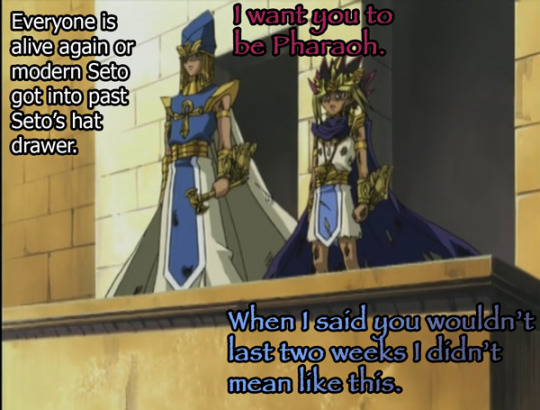
Oh, PS, I have no idea how his court is all alive again, Don’t worry about it, they weren’t alive in the first place. Everyone here is a dead guy de facto anyway.
Especially Yami.
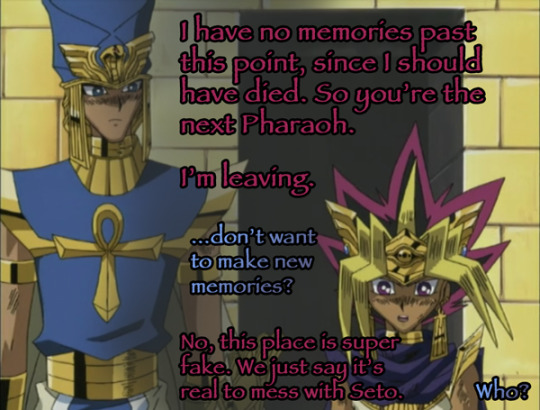
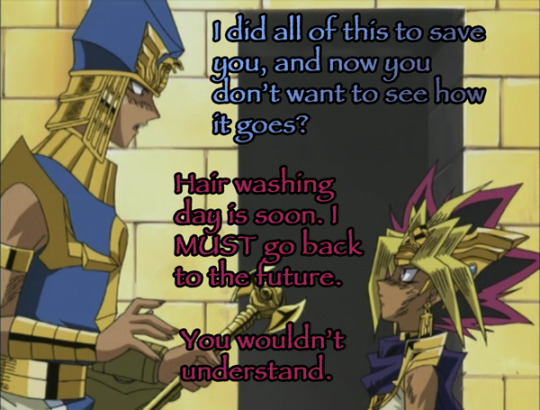
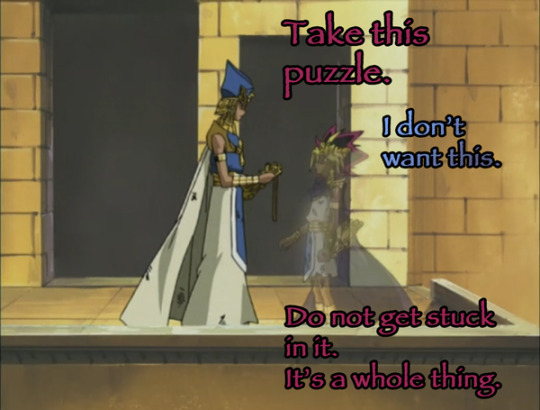
I assume that Hat Seto gets given the necklace by Yami because in the original storyline, he would have gotten the necklace after Yami died.
Although, I guess that necklace would have been in pieces and in a spooky ass box. Or maybe Seto was the one who made the spooky ass box and then shoved it in a cursed tomb with a sign that says "you will die if you open this tomb and this spooky ass box" That Mr Muto completely ignored.
No idea, but I never really think about how past Seto technically was a millennium necklace owner at one point, after Yami had died. Although it was like...out of batteries at the time and sleeping.
And then they conveniently peace the hell out of Dodge.
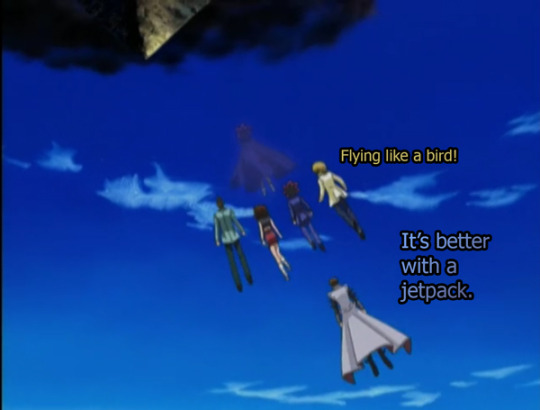
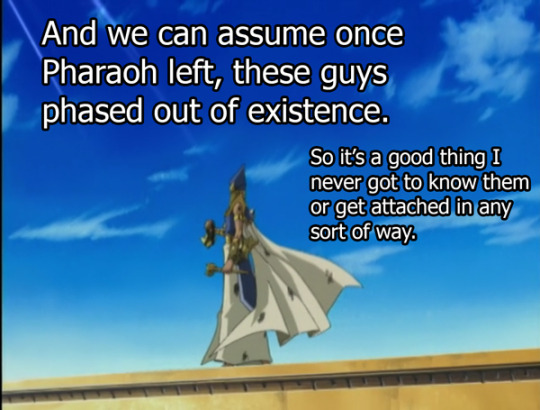
Lets not get me wrong, half of my lack of attachment has to do with never ending long covid and chronic fatigue and stress messing with my brainballs. But also…
…I feel like it’s missing something. Again, this was a season of excess in everywhere but it should have been. We had so many new characters who had a lot of potential. We had the overarching villain of the entire show. We had Yami learn about a past that has been hinted at for 4 seasons and now it’s here and like…it needed more time in the oven.
I was in film classes for a hot minute and they'd talk about story structure and about how the climax should be like 1/3 of your story most of the time. Imagine if this whole season had been this? Or 2 seasons? Then maybe I'd be more attached.
But it’s not a bad season, I think. I’ve seen way worse TV. But lets say, I understand why people maybe weren’t thrilled by this ending. Especially since next time, we gotta kill Yami. Youknow, the heart of the cards, the heart of the show, and the actual heart-throb to all the teens that watched this? Yeah that guy.
Lets straight up send him back to Hell.
(Normally I would put a link here to read these in chrono order, but I think I need to redo my tumblr template or something everything's moved around. But if you know, you know.)
#yugioh#photo recap#yugi muto#joey wheeler#tea gardner#seto kaiba#bakura#Yami muto#Atem#pharaoh#Season 5
30 notes
·
View notes
Text
Half asleep dumb Bleach AU where Quincy war goers really bad and they have to pull a time travel fix it but the only 2 strong enough to not die are Ichigo and Aizen.
The 2 ending up in the turn back the pendulum arc and Aizen instantly goes into full xanatos gambit mastermind planner mode... only to realize that is fucking impossible when you are working with Ichigo Kurosaki.
Every time he thinks he has found a way to create a long plan that will result in the Quincy end (And maybe himself as the soul king or all powerful) he turns around and Ichigo has already completely changed the time line AGAIN! Totally fucked up someones tragic backstory and he just takes a deep breath throws all his planning in the bin and has to go back to the drawing board (Since he can't actually murder Ichigo... he's tried)
Ichigo isn't trying to change much he doesn't have any grand plan just kill Yhwach, make sure his friends are safe and don't let Aizen do anything to Aizeny.
He ends up bonding with Gin, because Gin sees how powerful Ichigo is and more importantly how much he pisses off Aizen. He basically becomes Ichigo's shadow and just makes everything 10x more chaotic.
It becomes worse when Byakuya joins in he sees Ichigo shunpo at a speed that puts Yoruchi to shame and pretty much insists he teach him. And thus Ichigo has 2 shadows who mange to fuck up everything Aizen tries to plan.
(They disappear for a few days and Ichigo has somehow become king of Hucheo mundo no ones even sure how, there's also an adjuchas grimmjow following Ichigo around either trying to kill him or maybe court him no one can tell. Aizen takes one look at this pretty much throws months worth of planning in the bin and then goes and then just disappears into the Senkaimon to scream into the void)
Shinji is confused but he knows Aizen's planning something still he's sure of it and hasn't realized the plans have changed. Ichigo just watches the two for a bit and just turns to Aizen like 'So trying to murder and hollowify the guy you have a huge crush on is taking pigtail pulling to the extreme right?' Gin is dying laughing and Aizen is pissed and not happy because he has been doing fine with repressing and ignoring these feelings for centuries and can keep on doing it just fine thank you very much.
Thus begins Ichigo and Gin trying to match make him because that may make Aizen less crazy evil since Ichigo has watched the man stare all pinning and stupid after Shinji and stop staring at the many many maps and plans he have (most of them Ichigo thinks are plans for trying to murder him) and well it's fucking hilarious. Also he's pretty sure Shinji is just as bad since the man can ramble about Aizen for hours... literal hours Ichigo timed him and not all of it was how he's planning something evil...though a lot of it was.
Plus it's embarrassing to Aizen and hilarious.
#bleach#au#fic prompt#aishin#aizen sousuke#ichigo kurosaki#humor#gin ichimaru#grimmjow jaegerjaquez#aizen x shinji#grimmichi#I am just amusing myself at this point#shinji hirako
672 notes
·
View notes
Text
Evidence the sleepover was Teen's trial:
The Blood Moon is red for the Scarlet Witch's son. Also, if it's the "time when the veil between the dead and the living is thinnest" then this fits Billy as a disembodied soul in the body of a teen that would have otherwise died in a car accident.
A lot of teen's arc has been realizing how flawed Agatha is, so his trial may be confronting the scenario of Agatha's betrayal. He also feels some sort of connection to Nicholas Scratch, and part of the trial apparently involved contacting him.
It's a sleepover. I know Billy looks a bit old for those, but it's also possible that Billy's actual soul is still 10. (Or however old he was when Wanda took down the Hex.)
Finally, it's questionable that the trial is actually over. Not only did it seem like they didn't achieve anything, but the coven is actual worse off now. Plus, the last two trials ended with the witches all going down a slide. That didn't happen this time.
Billy seemed to think he was Nicholas Scratch. We don't know his backstory yet, but he said he grew up in Eastview with a normal family. It looks like when Billy was 13, he got into a car accident and came out with magical powers...and maybe even a second soul in his body that he was looking for the origin of. Maybe he was hoping the Witch's Road would show him.
If this is Billy's trial, and it's not over, I would imagine confronting the fact that he's possessed by the son of the notorious Scarlet Witch would be a big part of his personal development, and thus the trial. It's just hard to imagine how.
#Agatha All Along#Agatha Harkness#MCU#Marvel Cinematic Universe#Marvel Studios#Marvel Television#Billy Kaplan#Billy Maximoff
76 notes
·
View notes
Text
You know what would be diabolically fun for the end of E-Soul arc?
That even after 3 episodes, we still don't know if Yang Chen is the person who was present with Lin Ling or even killed Xiao Yueqing
Thus, when people vote in more Trust Value for E-Soul in the Top 10 Hero poll, you are left with two type of people:
People who vote for what they think is the truth
People who vote inspite of the truth
But no one would able to vote knowing the truth.
Just an interesting thought experiment that pops in my head
36 notes
·
View notes
Text
Chapter 214 Theory!!!
edit: either the scanlation I read made an error or I'm just stupid (probably the latter) so I've rewritten this post, but retained the original below it for posterity lol
Who is the person at the end?
Is it Polaris? Possibly.
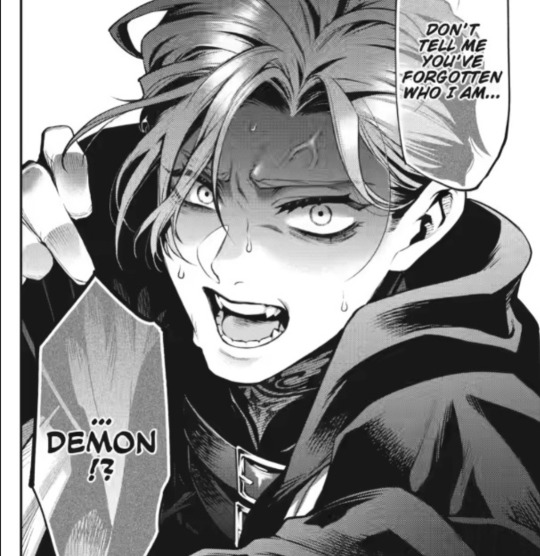
Because I am in the D. Gray-man fandom, and have therefore been a victim of the Past!Allen* confusion of the last (decade?) I am reluctant to accept this person as Polaris until we are EXPRESSLY told so.
*long story short; we were introduced to a character in a flashback without being told his name; based on the scene/context, the whole fandom assume his identity...and then recently found out he is someone completely different!
That being said; could it be Polaris? Sure! But what would Polaris have a history with Sebastian, when we already know Polaris to be someone linked to the Phantom Fam, as shown by their desire to "not lose anymore of them"? Additionally, how would Polaris know Sebastian to be a demon? (Yes, UT could have told him; but the way the above is presented implied that 1) this person has met Sebastian in his current form before and 2) knew Sebastian was a demon the first time they met.
Another case people have presented is that this is one of Sebastian's former contractors. I like this theory, too; but I don't believe it. As per the Blue Memory Arc, this is the first time Sebastian has appeared in this form in the human realm. Thus, why would this person know Sebastian?
My proposition: this is another demon! As Fairchild said, "guests of Any Kind are welcome here" which absolutely screams not everyone here is Human.
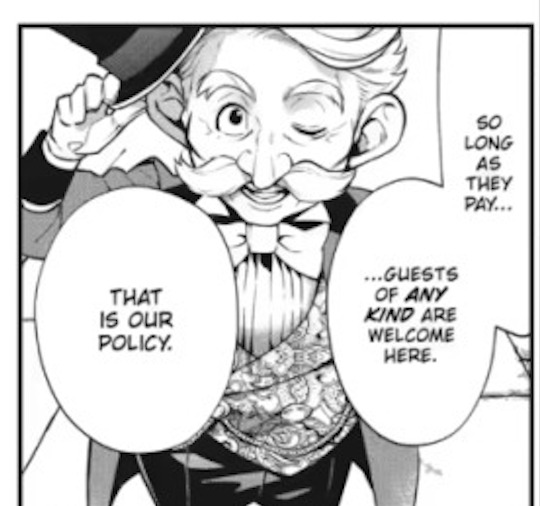
I guess that could reference Bizarre Dolls ("so long as they pay" is almost certainly a reference to Blood Collections), or even Reapers—but both of those groups of beings were once humans. Whilst my personal theory does have Demons being once human too, they are much more removed from Humanity than BD's and Reapers.
That being said, it could be interesting if this person was the demon whom Vincent sold his soul to, as is sometimes theorised! It could also tie into their desire to protect the Phantomhives. Maybe they even (re)gain some humanity as part of the contract, hence the IV bag—which, if this is not Polaris, may just be a disguise this person was using to get close to Sebastian. Obviously that fall was on purpose so as to get close to him!
So who is this person? I really don't know.
If they are Polaris, they are supposed to be attached to the Phantomhives, so why not even acknowledge O!Ciel?
If they are not Polaris, I am absolutely sticking to the Mary Jane Kelly theory mentioned below because it's funny and fits in with my Red Butler pt. 2 theory!)
I don’t think so. Polaris described himself as a butler; so probably not. More importantly, Polaris knows the Phantomhives; why would she say she was looking for Sebastian and not O!Ciel?
So, is she a past contractor that Undertaker revived? Possibly, but then why would she call him Sebastian. Heck, why would she even recognize him.
So, is she someone from an earlier arc? Three options:
The girl Seb chatted up for information on the Sphere Music Hall? Not impossible, and the most likely person on this list to know Sebastian by name.
The female aristocrat of evil we see in the Vanell arc? What ever came of her? I had a working theory that she would be a point of contact in France, but this works too! However, I will say this is the least likely of the three.
Mary Jane Kelly, the victim of Jack the Ripper whom Ciel made a grave for? Most likely, in my opinion — especially since Undertaker handled her burial, and it would further tie into my theory that we will see Madame Red again this arc!
#let’s chat#kuroshitsuji#kuroshitsuji theory#black butler#black butler theory#kuroshitsuji manga spoilers#black butler manga spoilers#kuroshitsuji chapter 214#black butler chapter 214#chapter 214
26 notes
·
View notes